Drag march draws thousands in SF
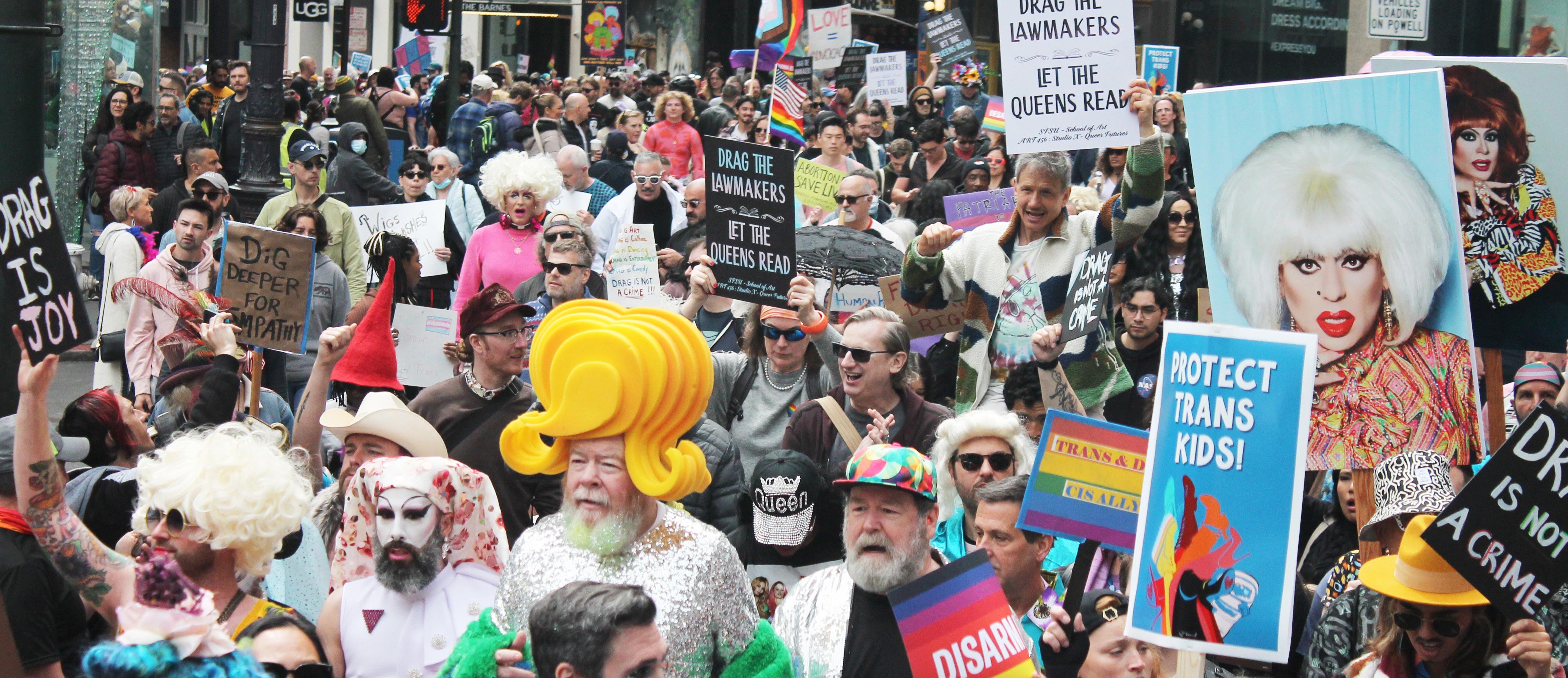 by Heather Cassell
by Heather Cassell
Kye Timmons, 33, a queer transgender therapist who works with transgender youth, said they were marching because, “I want young people to grow up into adults.”
Timmons’ partner, Tara Fumi Apriletti, 34, a queer nurse practitioner, was demonstrating because, “I love my partner.”
“The right-wing wants us to be afraid and we’re not gonna buy into it. We’re out here to stand up for what we believe in and say, ‘Hell yeah to queer
UC Berkeley employee pleads not guilty in Marsh killing
As part of the discovery process, prosecutors must provide the defense attorneys with the evidence that it intends to use in its prosecution.
Superior Court Judge James Cramer granted Briggs’ request for a preliminary hearing, scheduled for April 13 in Department 11 at the René C. Davidson Courthouse near Lake Merritt, so that the DA’s office can provide any witness statements, DNA evidence, and video it’s planning to use.
by John Ferrannini
AUC Berkeley employee charged in the stabbing death of a Black gay Oakland man pleaded not guilty in an Alameda County courtroom April 5 but his attorney is requesting documentation from the district attorney’s office to explain the charges.

“So far, they [the DA’s office] haven’t given me anything to explain why my client is being charged here,” David J. Briggs, a private attorney with an office in Richmond, told the Bay Area Reporter.


Briggs is representing Sweven Waterman, 38, of Oakland, who is in custody without bail at Santa Rita Jail in Dublin after having been charged by the Alameda County District Attorney’s office with the homicide of Curtis Marsh, 53, also of Oakland.
Marsh, who was also known as drag artist Touri Monroe, was a hair stylist and a Miss Gay Oakland emeritus who used to sing with the Oakland Gay Men’s Chorus. Originally from Iowa, friends described him as fun, helpful, and active in his church.

He was killed the morning of March 4, police said. Police responded to the 200 block of Vernon Street in the Adams Point neighborhood just before 8 a.m. after a report of a disturbance, Oakland Police Officer Darryl Rodgers stated in an email to the B.A.R.
The March 4 “disturbance” consisted of “reports of an individual screaming,” stated Paul Chambers, the strategic communication manager for the Oakland Police Department. When officers arrived, Oakland firefighters were on the scene extinguishing a fire.
“Upon arrival, officers located an Oakland resident with multiple lacerations,” Oakland Police Officer Darryl Rodgers stated. “The victim succumbed to their injuries and medical units pronounced the victim deceased on scene. Investigators from the OPD Homicide Section responded to the scene to begin the follow-up investigation into the circumstances surrounding the homicide.”
Neighbors told KTVU-TV that the perpetrator set the fire and left the front door and gate open when running away. No motive has been given, nor the circumstances of if - or how - the two men knew one another.
Waterman is on administrative leave from his job as a senior custodian with UC Berkeley, the school told the B.A.R. on March 13. He has six prior convictions dating back to 2002, including felony evasion, forgery, robbery, and vehicle theft, according to Berkeley Scanner.
A memorial was held March 11 at the Oakland LGBTQ Community Center where friends remembered Marsh.
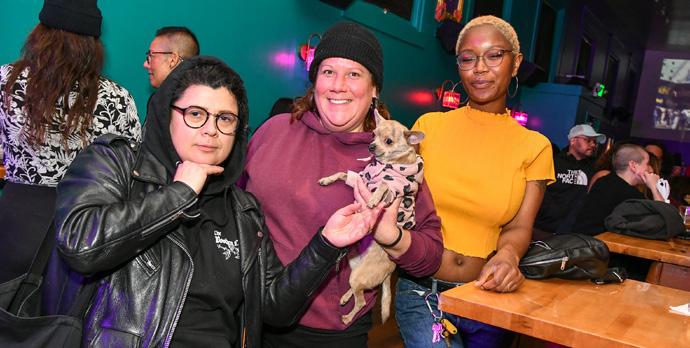
Marsh is one of two gay Black men who were killed in Oakland last month. But, so far, no suspect has been found in the March 12 shooting death of Devonte Davis, police told the B.A.R. March 28. The two incidents are unrelated.t
joy,’” Fumi Apriletti, whose parents, Asano Fertig and Jim Apriletti, were marching with the couple, said as the “Drag Up! Fight Back!” march got underway April 8 in downtown San Francisco.
The Bay Area’s LGBTQ community and allies came out in force for the demonstration and rally
meant to send a message that anti-drag and antiLGBTQ laws passed or proposed in many red states are neither needed nor tolerated. A smaller group took part in a rally outside San Francisco City Hall before marching to Union Square.
Bill that would have outed trans students dies in CA Assembly
bers Bill Essayli (R-Riverside) and James M. “Jamie” Gallagher (R-Chico) and - though it stood no chance of being passed in a Democraticcontrolled legislature - it had sparked an uproar, not the least of which came from gay state Senator Scott Wiener (D-San Francisco). He had taken to Twitter to call it a “DeSantis-style bill,” referring to Florida Republican Governor Ron DeSantis, who has signed into law several bills rolling back the rights of LGBTQ students.
by John Ferrannini
Abill that would have forced the outing of trans students introduced by two California Republican legislators is dead for the year after the chair of the Assembly’s education committee opted not to schedule it for a hearing.
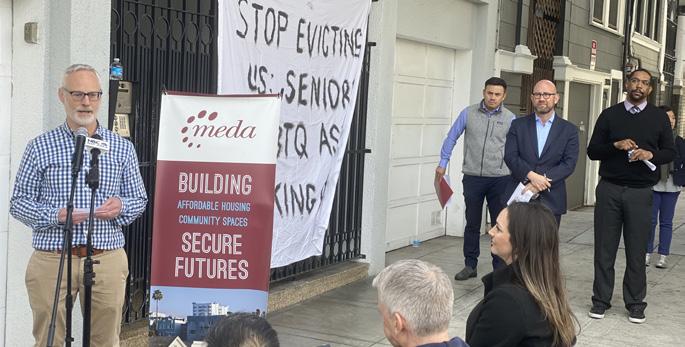
Assembly Bill 1314 would have required that parents or guardians be notified “in writing within 3 days from the date any teacher, counselor, or employee of the school becomes aware that a pupil is identifying at school as a gender that does not align with the child’s sex on their birth certificate, other official records, or sex assigned at birth.”
Under current law, school staff are required to use the pronouns and name a student requests, without official records being changed. Discrimination on the basis of gender identity is prohibited.
Jennifer Chou, the interim director of the Gender, Sexuality and Reproductive Justice Program at the American Civil Liberties Union of Northern California, told the Bay Area Reporter that “recognizing that students have a right to privacy, many school districts have adopted policies prohibiting teachers and administrators from discussing students’ sexual orientation or gender identity without their consent. Young people, not school staff, should decide if, and when, they come out to their parents.”
The bill was introduced by Assemblymem-
At least one Florida school district has adopted a policy requiring staff to notify parents if their pupil identifies as gay, or asks a different name or pronouns be used, according to them magazine.

“Nope, not in CA,” Wiener tweeted March 13. Essayli, quote-tweeting Wiener, stated, “I encourage you to read the bill and my thread. My bill is aimed at supporting trans minors, not hurting them. The notification requirement is only triggered when a minor is already publicly identifying by a different gender at school.”
“Children are the domain of their parents, not the government,” Essayli stated, defending the bill. “Schools cannot decide what information should or shouldn’t be shared with parents. Trans minors are higher risk for depression and suicide. More than 50% of trans minors have considered suicide.”
Wiener told the B.A.R. on April 10 that AB 134 is “a dangerous bill, and we will do everything in our power to ensure it dies a quick death.”
“Make no mistake, this bill would force teachers to out trans kids to their parents – whether or not the kid is ready to come out and whether or not that outing would put the kid at risk of violence,” Wiener stated. “This bill would traumatize thousands of trans youth, and it could put their safety at risk if they don’t have a supportive environment at home.”
The bill’s quick demise happened the same day after Assemblymember Al Muratsuchi (DTorrance), chair of the education committee, declined to schedule it for a hearing.
See page 15 >>

Serving the lesbian, gay, bisexual, transgender, and queer communities since 1971 www.ebar.com Vol. 53 • No. 15 • April 13-19, 2023 04 07 Castro elevator delayed Little Richard Mother Bar ARTS 17 17 The
Curtis Marsh Courtesy Oakland LGBTQ Community Center
Republican California Assemblymembers Bill Essayli, left, and James Gallagher saw their bill die in committee April 10.
Courtesy Essayli, Gallagher
See
page 14 >>
Heather Cassell
ARTS
“Drag Up! Fight Back!” demonstrators marched into Union Square from Powell Street in San Francisco on Saturday, April 8.
Biden admin crafts moderate proposal on trans athletes
by Lisa Keen
Transgender athletes saw two significant victories last week: one from the conservative U.S. Supreme Court and the other from the LGBTQ-friendly White House of President Joe Biden. The events triggered a flood of national media attention, and found lesbian tennis legend Martina Navratilova on the side of those wishing to bar transgender women and girls from participating in female sporting events.
Neither of the two developments changes any law at this time, but both represent pushbacks against a wave of hostile legislation in many states.
Moderate proposal
The Biden administration’s proposed rule change, from the U.S. Department of Education, cannot take effect until after a 30-day period during which the public can comment on the proposal and the Biden administration can take those comments into consideration.
LGBTQ legal groups noted that the proposed rule change means that blanket state bans on trans athletes are impermissible and that any restrictions must be supported by evidence

and minimize harm to trans students.
The 115-page proposed rule change would amend one section of Title IX of the Education Amendments Act, the federal law that prohibits discrimination “on the basis of sex” in schools that receive federal funding. The section (106.41b) says schools can have separate teams for males and females for contact sports. The Biden administration proposal seeks to add that if a school refuses to allow a transgender student to play on a team that matches their gender identity, the refusal must be based on a need to “minimize harms” and “be substantially related to the achievement of an important educational objective.”
“If a recipient adopts or applies sex-related criteria that would limit or deny a student’s eligibility to participate on a male or female team consistent with their gender identity, such criteria must, for each sport, level of competition, and grade or education level: (i) be substantially related to the achievement of an important educational objective, and (ii) minimize harms to students whose opportunity to participate on a male or female team consistent with their gender identity would be limited or denied,” states the text of the proposed rule.

The Biden administration has crafted a moderate proposal regarding trans student athletes attending schools that receive federal funding.
“This clarification regarding Title IX’s application to sex-related eligibility criteria is particularly important as some states have adopted criteria that categorically limit transgender students’ eligibility to participate on male or female athletic teams consistent with their gender identity,” stated the Department of Education’s Notice of Proposed Rulemaking. DOE said it developed the proposal after getting feedback from stakeholders through a public hearing, listening sessions, and correspondence. It also stated that it referred to policies developed last year
by the International Olympic Committee and the National Collegiate Athletic Association.
Biden has pledged support for trans kids as recently as his State of the Union address in February.
LGBTQ legal organizations were generally supportive of the administration’s proposal.
“Transgender youth are an integral part of every school across this country. We applaud the Department of Education for recognizing that the law requires that transgender students must be treated fairly and equally and as respected members of their school communities,” stated Imani RupertGordon, executive director of the San Francisco-based National Center for Lesbian Rights.
Shannon Minter, a trans man and NCLR’s longtime legal director, told Slate reporter Mark Joseph Stern that the proposal is clear that blanket bans on trans athletes are unlawful and that “any restrictions must meet a stringent test and would pass muster only in the context of elite competitions.”
Jennifer Levy, senior director of transgender and queer rights at GLBTQ Legal Advocates and Defenders, stated that the organization also supports the proposal.
“The proposed rule prohibits the kind of categorical bans adopted in too many states that are hurting transgender students and that send a dangerous message to all students,” Levy stated. “It also allows schools to adopt reasonable policies for inclusion of transgender athletes that take into account differences between sports and across levels of competition. With this proposal the Department is recognizing the importance of fair and equal treatment for transgender student athletes.”
Lambda Legal Defense and Education Fund expressed guarded support and concerns.
“This proposed rule includes critical recognition of the importance of participating in sports for transgender youth and shows why 100% of the state bans are invalid,” stated Sasha Buchert, Lambda Legal senior attorney and director of its Nonbinary and Transgender Rights Project.
“We are concerned about whether the proposed rule can properly eliminate the discrimination that transgender students experience due to the pervasive bias and ignorance about who they are,” Buchert added. “These students must have full and equal
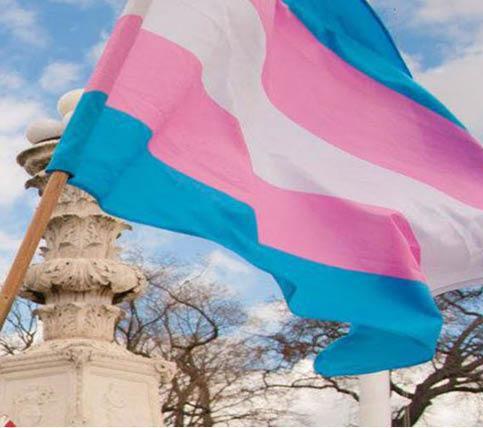
See page 10 >>
Heklina to be inducted on LGBTQ Wall of Honor
by Cynthia Laird
The late drag artist Heklina will be inducted onto the National LGBTQ Wall of Honor at the Stonewall Inn in New York City in June, according to Nicole Murray Ramirez, a Latino drag queen and community leader who helps oversee the memorial project as a member of the Imperial Court System.
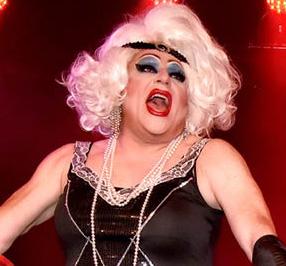
Heklina, the drag persona of Stefan Grygelko, was found dead in London April 3, according to her friend Peaches Christ, who was with Heklina
as they were set to perform “Mommie Queerest” in the city. Heklina, 55, had long lived in San Francisco until moving to Palm Springs several years ago.
On April 12, Juanita MORE! announced that a memorial will be held Tuesday, May 23, from 8 to 11 p.m. at the Castro Theatre. For more information, go to https://bit.ly/3zSSsXd Information shared April 7 from Peaches; D’Arcy Drollinger, owner of the Oasis LGBTQ nightclub in San Francisco; and Grygelko’s estate stated that police did not suspect foul play or
assault in Heklina’s death, according to a post mortem performed by London officials.
Murray Ramirez told the Bay Area Reporter April 11 that Heklina and Darcelle XV, a drag queen and former empress in Portland, Oregon, would be inducted in the National LGBTQ Wall of Honor. The memorial to deceased LGBTQ luminaries was started in 2019 as part of the Stonewall 50 anniversary. The Stonewall riots of 1969 are viewed as the birth of the modernday LGBTQ rights movement.
CONTRACTING OPPORTUNITIES

B USINESS ! I NCLUDING M INORITY, WOMEN, AND DISABLED VETERANS
Darcelle XV, the drag persona of Walter Cole, at 92 was the world’s oldest living drag queen until her passing. She died March 23 in Portland.
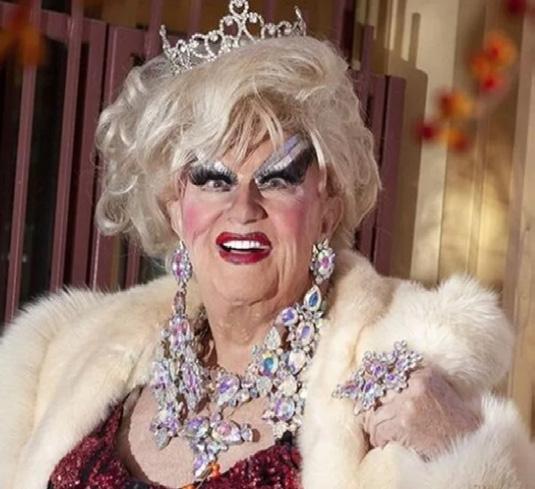
“I knew both of them,” Murray Ramirez said during a phone interview. “They inspired and entertained a lot of people.”
Murray Ramirez said that as soon as she learned of the two drag artists’ passing, she immediately contacted representatives of the National LGBTQ Task Force, which partners with the Imperial Court on the honor wall. This year’s induction ceremony is set to take place at 2 p.m. (Pacific) Thursday, June 22, at the iconic gay bar, now part of a national historic site.
Murray Ramirez, as the Queen Mother I of the Americas and Nicole the Great, is the titular head of the Imperial Court System, the philanthropic drag organization that began in San Francisco in 1965.
“Darcelle was a role model for me,” Murray Ramirez added.
As for Heklina, she was remembered at the April 8 “Drag Up! Fight Back! march and rally that took place in San Francisco. People carried posters with her photo, and she was mentioned during speakers’ remarks.
“Heklina as a performer made you laugh,” Murray Ramirez said. “That’s a gift.”
Heklina was a pioneering figure in the San Francisco drag scene and an outspoken advocate for LGBTQ+ lives, the statement explained. She was the co-founder of the iconic and transgressive drag night Trannyshack, which became an important mainstay of the San Francisco nightlife scene in the 1990s and 2000s. (The name of the show was later changed to Mother.)
She later sold her stake in Oasis and moved to the Coachella Valley in Riverside County.
The statement from Grygelko’s estate added that Heklina’s “work as a producer and performer included collaborations on stage and on film, with one of her best friends Peaches Christ.
Heklina’s accomplishments as a performer, producer, and transgressive LGBTQ+ rights advocate have left an indelible mark on drag, the entertainment industry, San Francisco, and the queer communities worldwide.”
Heklina’s sudden death prompted an outpouring of support in the Bay Area and around the world. In her own statement she emailed to supporters of Oasis April 4, Drollinger called Heklina’s passing “a devastating blow to the community” that was personally heartbreaking.
“I have known Heklina for 34 years. Opening the Oasis was a crowning achievement we shared, after performing for so many years in other people’s venues, to create our own space was a dream neither of us believed we could do and yet we did it together,” wrote Drollinger. “She’s been my Carrie Bradshaw, my Janet Wood, my Darlene Conner, my Phoebe Buffay, and my Dorothy Zbornak. Heklina could push all my buttons and at times make me crazy and I still love her.”
Drollinger added, “I was there the very first time she ever did drag, it wasn’t a pretty sight. In my wildest dreams I wouldn’t have expected her to become such an icon. And yet she did.”
In accordance with Heklina’s wishes, Grygelko’s estate encourages those who wish to remember Heklina to support their favorite queer organization and/or the GLBT Historical Society in San Francisco (https://www. glbthistory.org/).
The London Metropolitan Police did not immediately respond to an email requesting additional information on Heklina’s death.
Murray Ramirez said that five other people will be inducted this year.t
2 • Bay area reporter • April 13-19, 2023 t Visit us at https://dot.ca.gov/ or email smallbusinessadvocate@dot.ca.gov or more information Use cell phone camera to scan QR code above to access information about Caltrans upcoming opportunities
AVAILABLE
FOR SMALL
<< National News
Heklina performed in February 2020 at her last Mother show at Oasis.
Gooch
Darcelle XV will be inducted into the National LGBTQ Wall of Honor.
Instagram
At Gilead, we understand that it’s going to take a combination of both science and social change to help end the HIV epidemic for everyone, everywhere. It’s only by collaborating with advocates and organizations across the country that we can reach this collective goal. Together, we’re working tirelessly to improve health equity and bring awareness to the HIV epidemic.


GILEAD and the GILEAD logo are trademarks of Gilead Sciences, Inc. © 2023 Gilead Sciences, Inc. All rights reserved. US-UNBC-1421 03/23
we
HIV epidemic.
our collaborations at GileadHIV.com.
Together,
can help end the
Explore
San Francisco Community Health Center & Gilead
SF tenants’ long eviction nightmare ends
by John Ferrannini
The end of a stalemate between landlords and tenants in an apartment building near Mission Dolores Park was heralded with a jubilant news conference April 6, at which it was announced that a nonprofit has acquired the building – allowing the renters to stay.

The Mission Economic Development Agency purchased the building at 3661 19th Street for $7.48 million, as part of the city’s Small Sites Program, which is funded by the Mayor’s Office of Housing and Community Development.
As the Bay Area Reporter reported back in 2021, the 12-unit, rent-controlled complex was bought by two limited liability corporations in August 2018. Shortly after the purchase – in spite of alleged assurances from a prior owner – the LLCs began efforts to evict the tenants through the Ellis Act.
The Ellis Act, signed into law by then-governor George Deukmejian in 1985, is a state law that prevents municipalities from banning evictions if the property owner decides to go out of business as a landlord. It was one of the few forms of eviction allowed to continue during the COVID-19 pandemic lockdowns.
Now, through the city’s small sites program, MEDA has purchased the
building, according to the mayor’s housing office.
“MEDA officially purchased the site on January 27, 2023 which ended a no-fault Ellis Act eviction that would have displaced longtime BIPOC [Black, Indigenous and people of color], LGBTQ+, and senior residents,” stated Anne Stanley, communications manager for the office. “The building is now preserved as permanent affordable housing and will undergo rehabilitation to address seismic, electrical, plumbing, elevator, and roofing upgrades.”
The city committed $9.9 million in permanent financing for the building, including acquisition and rehab, according to an information sheet from the Citywide Affordable Housing Loan Committee. The funding source is general obligation bonds.
Jose Garcia, preservation program manager at MEDA, said at the news conference that “we are proud to have worked alongside these residents and community to make this possible.”
Eric Shaw, a gay Black man who is the director of MOHCD, told the B.A.R. that “central to our office’s mission is investing in programs that support efforts to fight displacement and increase housing stability for all San Franciscans.”
“The acquisition of 3661 19th Street ended a no-fault Ellis Act eviction that

would have displaced long-time San Francisco residents,” he stated. “The 12-unit building will now remain permanently affordable for current and future tenants.”
Tenant Paul Mooney – who played
Below Market Rate (BMR) Rental Apartments Available 603 Tennessee at 603 Tennessee Street, San Francisco, California 94103
3 Below Market Rental Units Available
One-1 bedroom rental unit available at $1,436.00 per month
Two-2 bedroom rental units available at $1,597.00 per month
Two parking spaces available to BMR renters for an additional $100 a month and will be offered to households in lottery rank order. Must be income eligible and must not own a home. Households must earn no more than the maximum income levels below:
55% AMI
55% AMI (MOHCD)
1 person- $53,350; 2 persons-$60,950; 3 persons-$68,600; 4 persons-$76,200, 5 persons-$82,300
Applications must be received by 5PM on Friday, April 14, 2023. Apply online through DAHLIA, the SF Housing Portal -DAHLIA at housing.sfgov.org. Please contact the Imagine That Consulting for building information at (916) 686-4126 or 603tennesseebmr@gmail.com.
Units available through the San Francisco Mayor’s Office of Housing and Community Development and are subject to monitoring and other restrictions. Visit sf.gov for program information.
a key role in organizing his fellow residents – celebrated the victory.
“I’m happy to announce that we won!” Mooney said. “I moved to San Francisco as a gay man looking for a community of my own, looking for a place to call home. I love it here: this wonderful, weird, wacky city and this neighborhood. I couldn’t imagine living anywhere else as magical as this place.”
Mooney’s tenacity was saluted several times during the news conference – from rerouting his morning walk so he could check in at MEDA’s offices to, as the B.A.R. reported at the time, buying fake coal and delivering it to the former landlords at their homes in Redwood City.
Mooney said that this is proof “you can beat the Ellis Act. You can fight an eviction.”
Steve Collier, a gay man who’s an attorney with the Tenderloin Housing Clinic, said, “it was really a battle on all fronts.” By pushing the prior landlords both in and out of the courtroom, Collier said the tenants were able to have them realize it made more financial sense for them to accept a deal.
“Their whole business plan was to get the tenants out in three months,” Collier said at the news conference. “It’s crazy to think they can get away with that in San Francisco.”
“Not with Steve Collier,” interjected gay District 8 Supervisor Rafael Mandelman. The building is in his district.
“It’s a great outcome for these ten-
OKELL’S FIREPLACE

ants, and it’s also great that District 8 will have 12 more permanently affordable units in a neighborhood that has experienced significant gentrification and displacement,” Mandelman stated to the B.A.R. “I’m very grateful to the mayor’s office, MEDA, Tenderloin Housing Clinic, community advocates, and the residents themselves for their perseverance.”
Mandelman said at the news conference that Districts 8 and 9 (the Mission) are the epicenter of no-fault evictions in the city.
“These are wonderful communities and the things that make them wonderful to live in make them wonderful for speculators,” the supervisor said.
“There’s a special place in heaven for attorneys in San Francisco, on the frontlines every day,” he added, thanking Collier for his 36 years of service in fighting evictions.
The building’s current occupants are 60% LGBTQ, 50% Asian American/BIPOC, and one-half are senior citizens with “a large majority [of] people living with disability,” according to a MEDA fact sheet.

Larry Kuester, a gay man who’s lived in the building for 33 years, the longest time of any tenant, according to MEDA, is just happy it’s over.
“It’s been extremely stressful,” he said. “I’m delighted. It’s the best news we could receive.”
The former owners of the property could not be reached for comment.t
4 • Bay area reporter • April 13-19, 2023 t 415-626-1110 130 Russ Street, SF okellsfireplace.com info@okellsfireplace.com
Valor LX2 3-sided gas fireplace shown here with Murano glass, and reflective glass liner
<< Community News
Paul Mooney, left, a tenant at 3661 19th Street, spoke to supporters and the media during an April 6 news conference to announce that the Mission Economic Development Agency has purchased the rent-controlled building where he and others live. Listening to Mooney are Jose Garcia of MEDA, District 8 Supervisor Rafael Mandelman, and Eric Shaw, director of the Mayor’s Office of Housing and Community Development.
John Ferrannini
winsbigin Assemblyrace
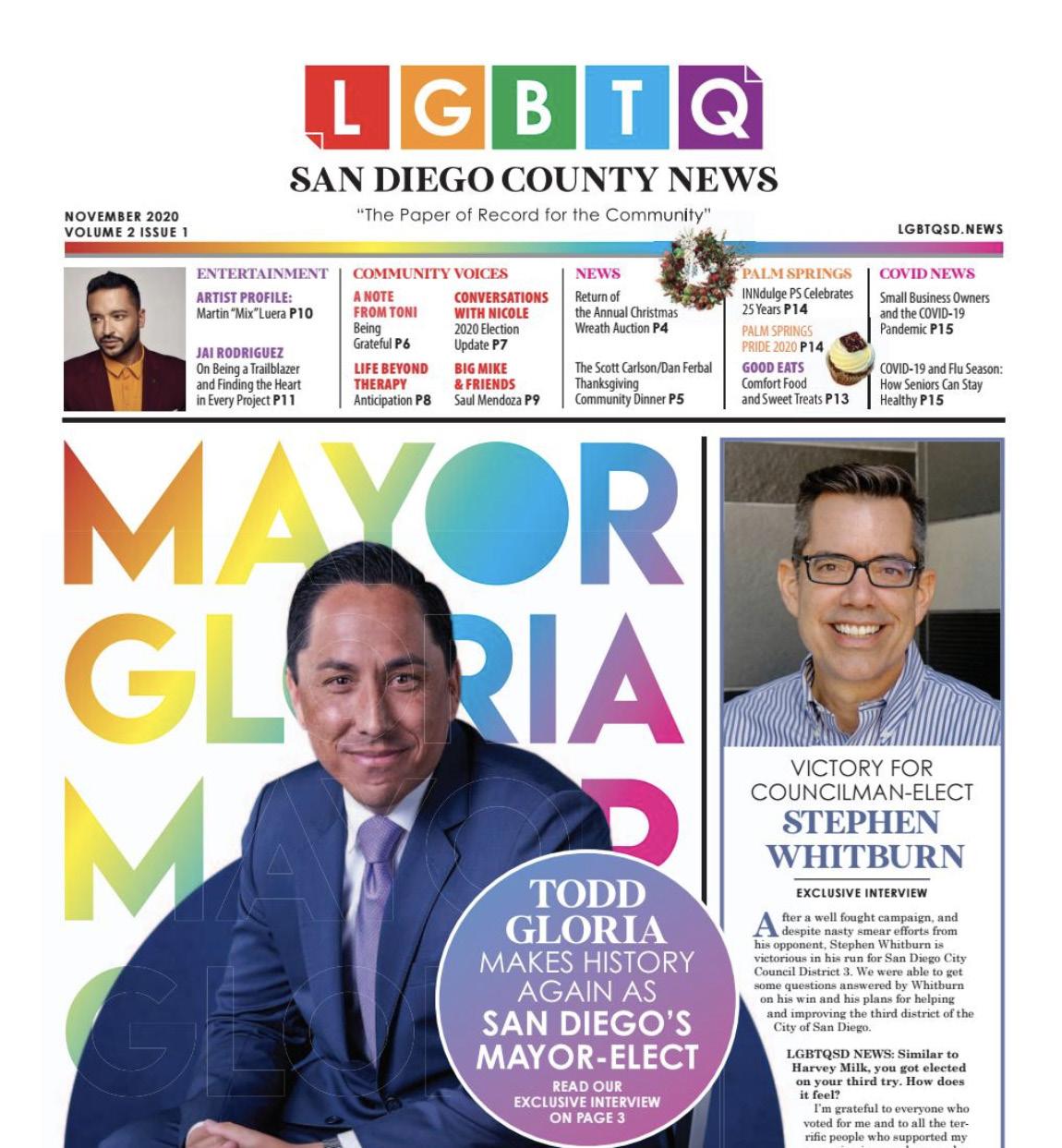





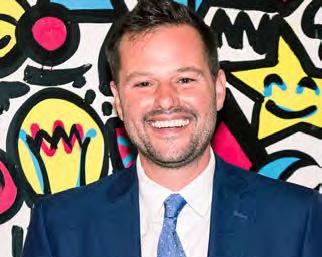



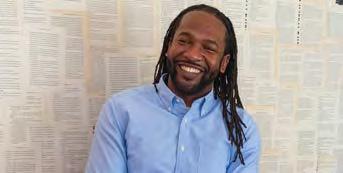

No. 673 • May 27, outwordmagazine.com2021 SPECIAL ISSUE - CALIFORNIA PRIDE! Celebrate Pride Serving the lesbian,gay,bisexual,transgender,and queer communities since 1971 www.ebar.com Vol. 52 • No.16 • April 21-27, 2022 3 8 Cannabis co. forming 13 The See page 10 >> by Matthew S.Bajko District 6 Supervisor Matt Haney declaredvictoryTuesdayinthespecial runoff election for San Francisco’s vacant 17th Assembly District seat based on the initial vote count. Trailing in second was David Campos,a gay man who is a vice chair of the California Democratic Party. Haney took first place with 64% of the vote-by-mail ballots that the elections department received and processed before Election Day, while Campos received 36%. With3,306votesreceivedfrompollingplaces where people cast their ballots in person Tuesday added in, Haney’s total vote count stood at 38,916 votes and Campos’ was at 22,567 votes. Because most ballots were expected to be mailed in ahead of Election Day, Haney thanked voters for electing him to the Assembly seat representing the city’s eastern neighborhoods as soon as the first election results were posted. “First results are out:We’re up by over 27 points. We won,” tweeted Haney. “Thank you so much to San Francisco voters, & to all of our staff, volunteers, donors, endorsers, & everyone who worked so hard over the last 6 months.” Campos told his supporters as the first numbers came in that “it doesn’t seem like we are going to be able to win this race.” According to the elections department it still has approximately 16,400 ballots to count and expected to receive approximately 2,700 vote-by-mail ballots onWednesday. It will next update the vote count in the race at 4 p.m.Thursday,April 21. The progressive politicians were the top two finishers who advanced out of the February 15 election to fill the seat vacated by David Chiu, who in November became San Francisco’s first Asian American city attorney. In that contest Haney had also placed first,though by a narrower margin of about 700 votes. TheyhavealsobothqualifiedfortheJune 7 primary race for a full two-year term in Christopher Robledo Haney
Assemblymember-elect Matt Haney by Matthew S.Bajko
alifornialegislatorsareonceagainpushing forward on a number of bills aimed at improving the lives of the state’s transgender and nonbinary residents. And due to the legislative attacks on trans children in several other states, lawmakers in Sacramento are also focused on assisting those youth and by Cynthia Laird MayorLondonBreedhasmadeitofficial and appointed Pau Crego as the per manent executive director of the San FranciscoOfficeof TransgenderInitiatives. Crego, a trans and nonbinary Spanish immi grant,hadbeenservingasactingexecutivedirec torsinceClairFarley,atranswomanwhoheaded the department since 2017, stepped down last Septemberafterleadingtheofficeforfouryears. Breed and City Administrator Carmen Chu madetheannouncementApril21. The office was established by the late mayor Ed Lee in June 2016 with Theresa Sparks as its inaugural director. It marked the first time a mayor in the nation had a senior director of trans initiatives, Lee’s of fice stated at the time. (Santa Clara County’s Office of LGBTQ Affairs was started in 2015, and there are similar officesinPhiladelphiaandWashington,D.C.) In a phone interview April 19, Crego, who started at the trans office in 2017 and rose to deputy director before taking over on an interim basis, said he was honored by the appointment. “I’m thrilled,”he said.“I’ve been with the Of fice of Transgender Initiatives almost since the beginning. It’s an exciting opportunity for me andthetranscommunitylocally.” CregotappedaspermanentED ofSanFrancisco’stransoffice 'PrEP Play' at NCTC ARTS 14 SF Filmfest faves ebar.com/subscribe BREAKING NEWS • EXCLUSIVE CONTENT • SPECIAL OFFERS & DISCOUNTS Courtesy CA Assembly Several LGBTQ-related bills are being heard in Sacramento. Transissues topCALGBTQ legislativepush Sisters’ Easter party a hit The Sisters of Perpetual Indulgence brought their Easter party back to Mission Dolores Park Sunday,April 17,for the first time since the outbreak of the COVID pandemic and the crowd was thrilled.This year’s Hunky Jesus was“Black Woman is God”(Brittany Henry) and the Foxy Mary, at far left,was“Transgender Maria de Guadalupe” (Shane Zaldivar).The day before,nearly two-dozen Gooch ARTS Sci-fi writing program CALL 415-829-8937 OR EMAIL ADVERTISING@EBAR.COM FOR MORE INFORMATION San Francisco Sacramento Los Angeles San Diego Reach Califoria’s largest audience of LGBTQ consumers
C
Castro biz group conditionally endorses APE theater plans
by John Ferrannini
The Castro Merchants Association
voted April 6 to endorse Another Planet Entertainment’s plans for the Castro Theatre without demanding a contractual agreement with the concert promotion company.

The merchants did, however, vote that supporting the plan is dependent on gay District 8 Supervisor Rafael Mandelman’s office accepting an economic impact report from APE, and APE completing another one if the first one is found unacceptable.
The decision was hammered out during an at-times tense membership meeting. It also came just days after San Francisco Board of Supervisors President Aaron Peskin issued a powerful ultimatum, giving APE two weeks to come to a compromise acceptable to the community before the supervisors take up a proposal to landmark the historic movie house’s interior, as the Bay Area Reporter reported.
The imbroglio over the theater began in January 2022, when APE –which runs the Outside Lands music festival in Golden Gate Park and the
Bill Graham Civic Auditorium downtown – was announced as the new operators of the 101-year-old Castro Theatre.
APE wants to make significant changes to the theater’s interior, including replacing the current fixed seating with a motorized floor that’d make both raked seating and tiered standing arrangements possible.
Some Castro neighborhood and LGBTQ and film groups – such as the Castro LGBTQ Cultural District and the Castro Theatre Conservancy – formed the Friends of the Castro
Theatre Coalition in opposition to the proposed changes, which would allow the theater to sometimes operate as a concert venue.
APE has recently stated that the number of films shown at the theater will be shown about one-third of the time, which has dismayed moviegoers and many others.
On Monday, the supervisors’ land use and transportation committee, which is where Peskin issued his warning, voted to continue the interior landmarking item for two weeks at the request of gay District 8 Supervisor Rafael Mandelman. He said the time would be used to attempt to forge a compromise between APE and its detractors.
In February, as the B.A.R. previously reported, the San Francisco Historic Preservation Commission approved recommending expanded interior landmarking for the Castro Theatre but stopped short of specifically stating the orchestra seats were part of that. Instead, the commission recommended to the Board of Supervisors that the “character defining features” for the orchestra level include the raked floor, aisles and “presence of seating.” It did recommend landmark status for 1920s seats in the balcony. It was that recommendation the land use committee was considering April 3.
Those advocating for keeping the orchestra seats asked the historic preservation commission to further clarify the language in the proposed ordinance to more accurately restate the factual findings approved by the planning commission, but the commissioners declined to do so. At the land use committee meeting, numerous speakers advocated that the supervisors amend the preservation commission’s determination with “fixed seating.” District 5 Supervisor Dean Preston, who is vice chair of the committee, said he’s in favor of such an amendment.
After the merchant meeting, gay association President Terrance Alan said he’d never intended to stand in the way of APE, per se. He had expressed disappointment that the Castro Community Benefit District had been collecting signatures from businesses in support of APE’s plans – without a binding, contractual agreement, as the B.A.R. previously reported.
APE has released a community benefits package, as the B.A.R. previously reported, but it is not binding.
“I want a process that is voted on by the members in the open member meeting we just had,” Alan told the B.A.R. “I am disappointed the CBD joined Another Planet in jumping the gun by distributing the petition to merchants that was not worded carefully.”
Andrea Aiello, a lesbian who is the executive director of the CBD, told the B.A.R. in response that small businesses took it upon themselves to support APE.
“A Castro Community Benefit District board member and a small business owner in the Castro together collected signatures from Castro Merchants members and non-members on a petition to support Another Planet Entertainment’s proposal to restore the Castro Theatre,” she stated after the initial online publication of this report. “Because they know that small business owners have a difficult time spending hours at City Hall to provide public comment, the petition is being circulated to give individual small
business owners a voice at the upcoming hearings. The petitions will be submitted at these hearings.”
Alan said he would have preferred a contract.
Nonetheless, he said during the meeting he hopes the vote will “be a healing moment,” and chided those laughing in the room.
The vote passed with two abstentions and one no vote: Joseph Titi of The Artist’s Gallery, located at 4406-A 18th Street.

“It baffles me,” Alan said after the vote. “But that’s democracy.”
David Perry, a gay man who’s a spokesperson for APE, heralded the vote as a victory.

“Thank you to all the small businesses in the Castro and the Castro Merchants,” he stated. “We are honored by your faith and look forward to restoring the Castro Theatre to its historic architectural glory and its historic place within the cultural life of the city including vibrant offerings for the film and LGBTQ+ communities.”
Mandelman told the B.A.R. that “the merchants’ feedback is important, and I think their support (even conditional) for the project will be significant for APE moving forward. I and my office continue to work with APE, community stakeholders and the mayor’s office to try to address as many reasonable concerns about the project as we can.” He did not answer a follow-up question as to whether his office would look at the economic report and decide if it’s acceptable.
Tense discussion preceded vote
The art of political compromise has been compared to sausage-making, and the decision came after the merchants hammered out various concerns.
Mary Conde and Dan Serot appeared representing APE; Jen Reck, a professor in the Department of Sociology and Sexuality Studies at San Francisco State University, appeared representing the Friends of the Castro Theatre Coalition.
Frank Tiecedes, president of the Duboce Triangle Neighborhood Association, challenged the APE representatives – saying that the company’s promises should be followed up by a binding agreement.
“We want to know there’s something we can do,” if APE does not follow through, he said. “It’s not because we don’t trust you – it’s because it’s a business.”
Conde said that since APE has submitted documents with the San
Francisco Planning Commission, it is “a condition of our approval” to move forward with the renovations.
Reck cast doubt on that.
“City hearings are about the renovation and restoration of the theater,” Reck said. “Are these going to be binding on the business community in terms of what you need?”
The initial motion, championed by Alan, included three prongs: the preparation of an economic impact report, a contractual agreement between the merchants and APE, and agreement with “APE’s good-faith participation in negotiations convened by Supervisor Mandelman.”
It became very clear it was the second item – the contract – that was the stickler.

Ray Connolly, co-owner of Eureka Sky on 17th Street, said there are many merchants who didn’t want the second prong.
“These merchants are in support of APE investing $15 million,” he said, referring to those who signed the CBD petition and APE’s estimates of what it plans to spend renovating the theater.
“Who is going to show up to renovate that theater?”
Terry Asten Bennett, a straight ally who co-owns Cliff’s Variety on Castro Street, moved to strike the second prong and amend the first to say that APE should submit an economic impact report – APE claims to have already conducted one – to Mandelman’s office, which will judge whether it is acceptable.
If it is not acceptable to him “they will enter into negotiations with Supervisor Mandelman,” Bennett proposed.
The third item was left as stated.
Stephen Torres, a queer man who’s the executive co-chair of the Castro LGBTQ Cultural District board (a major coalition backer), told the B.A.R. after the meeting that “we support the Castro Merchants Association as a member of the coalition for what they are asking for in this resolution.”
When asked about the contract question, Torres demurred.
“This is their membership, from our perspective,” he said. “We think a contract makes sense.”
Torres told the B.A.R. that the district sent a letter April 4 to APE and the Nasser family (which owns the theater) asking for a meeting.
“We hope that you understand the gravity of this situation and the strong message which the supervisors have conveyed to you in support of our community and this legacy world heritage site,” the letter states. “We strongly urge you to resume official engagement with the Castro LGBTQ Cultural District in substantive and binding ways.”
Terry Beswick, a gay man on the merchants’ board, told the B.A.R. after the initial online publication of this report that “we want the theater open and activated as soon and as much as possible.”
“We’re hopeful that the negotiations will lead to substantive community partnerships with film and LGBTQ programming on all those dark days,” he said.t
6 • Bay area reporter • April 13-19, 2023 t RECEIVE OUR FREE WEEKLY EMAIL NEWSLETTER, BREAKING NEWS, SPECIAL OFFERS, GIVEAWAYS AND MORE! Sign up! ebar.com/subscribe
<< Community News Dignity / San Francisco is hosting a special event book signing (copies will be available) Sunday, April 23rd after 5pm Liturgy 1329 7th Avenue (@Irving) dignitysf@gmail.com for more information
The Castro Merchants Association voted to endorse Another Planet Entertainment’s plans for the Castro Theatre at its April 6 meeting.
Scott Wazlowski
Members of the Castro Merchants Association raise their hands to vote on conditionally backing Another Planet Entertainment’s Castro Theatre proposal.
John Ferrannini
still waiting on the insurance documentation from BART.
While the agency still expects construction to take 20 months, Gordon said an additional three months “for contingency” if needed have been added to the timeline. Thus, it pushes the expected completion date into early 2026, she explained.
The new elevator had first been proposed in 2016, as the current elevator for the Castro Muni Station is across the street from its main entrance near Pink Triangle Park where 17th Street meets Market Street, which can be hard to access for wheelchair users and others with mobility issues. If out of service, then there is no way to access the station without using stairs or an escalator.
by Matthew S. Bajko
San Francisco transit officials now say the opening of a new elevator at the Castro Muni station in the city’s LGBTQ district won’t happen until “early 2026,” a year longer than was predicted in January. As of this week, there is still no starting date for the $11.5 million project.

As the Bay Area Reporter had reported in early February, the commission that oversees San Francisco Public Works unanimously approved a contract for that amount in January with CLW Builders Inc., which was the lowest bidder to build the elevator. The city agency has overseen the design of the four-stop lift for the San Francisco Municipal Transportation Agency, which operates the underground subway station at the corner of Castro and Market streets.
But a delay in SFMTA finalizing the insurance certificate for the project with BART has slowed the permitting process. The regional transit agency’s real estate team has been working with city staff on the issue.
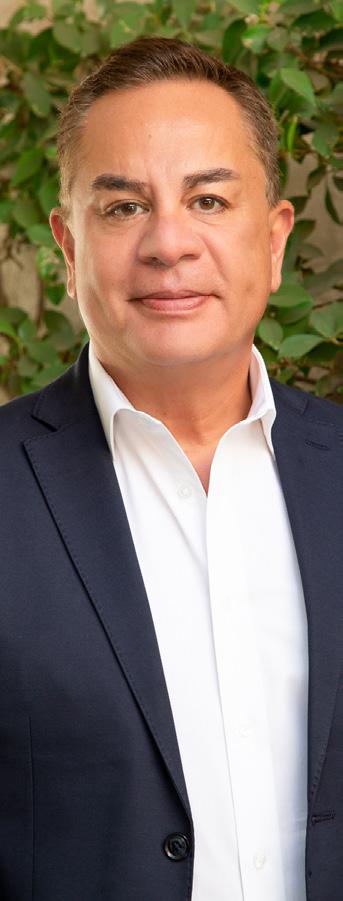
“It has not been finalized yet. The groups are still working to finalize insurance requirements,” BART chief communications officer Alicia Trost had told the B.A.R. in late March. The regional transit agency built the Castro Muni Station in the 1980s and leases it to SFMTA.
Trost told the B.A.R. Wednesday morning she was waiting on an update from the agency’s staff about the status of the permitting issue. Last week, SFMTA spokesperson Stephen Chun could only say that “the project is estimated to start construction in Spring 2023 and projected to be completed early 2026” in response to the B.A.R.’s question regarding its status.
The project’s website also now reflects that timeline. It lists it as currently being in the bid phase.

Public Works officials had hoped to break ground on the glass and steel elevator in March, with the work expected to take 20 months. Under that timeline, the elevator was to be completed sometime in early 2025.
But Chun told the B.A.R. this week that the timeline had to be pushed out due to the permitting issues taking longer than expected to be resolved. In addition to the insurance issue, protests lodged by the losing bidders for the project also needed to be resolved before the SFMTA could award the contract to CLW Builders Inc., noted Chun.
“With that said, the change of 2025 to 2026 was due to this very situation; a delay in the issuance of the construction contract related to bid protests,” he wrote in an emailed reply. “Now that the protests are resolved, the selected contractor has been submitting their pre-construction documents and certifications and we are waiting
from (the city’s) OLSE team before we can schedule the pre-job meeting in order to get construction started.”
OLSE stands for Office of Labor Standards Enforcement. Public Works spokesperson Rachel Gordon told the B.A.R. Wednesday that the agency is
Market Street headed toward Collingwood Street so it is usable for people in wheelchairs. New plantings, bench seating, and interpretative signage about Milk will also be installed in the plaza’s below-grade area adjacent to the subway concourse level.
City officials had pushed back their initial timeline for the elevator project in order to allow for community discussions to take place on a proposal to completely redo Harvey Milk Plaza. It
is a separate project being overseen by the Friends of Harvey Milk Plaza that has also faced delays, and gone through multiple architects and design concepts.
Initially estimated to cost $10 million, an exact price tag and funding source for the plaza remodel project remains unknown. Its proponents now expect the renovation to be “shovel ready” this summer, and are seeking private donors and other fiscal sources to pay for it.t
As the B.A.R. previously reported, the elevator project includes several upgrades to Harvey Milk Plaza, named in honor of the city’s first gay supervisor who represented and lived in the Castro. Several of the existing lighting fixtures will be replaced, plus the red paver bricks will be removed to install sparkle grain integral color concrete that matches the paving installed when the sidewalks along Castro Street were widened.
The elevator project will also result in a wider segment sidewalk fronting
Help Build Meaningful, Compassionate Connections in Your Community
Shanti’s LGBTQ+ Aging & Abilities Support Network (LAASN)
Since 1974, Shanti has trained over 20,000 Bay Area volunteers to offer emotional and practical support to some of our most marginalized neighbors. LAASN offers emotional and practical support to LGBTQ+ older adults and adults with disabilities who face isolation and need greater social support and connection.


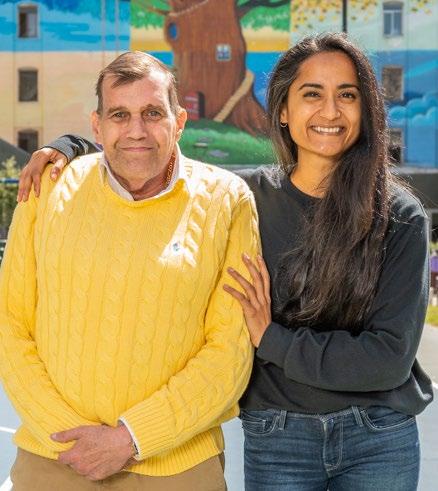
Shanti LAASN peer support volunteers:
Go through the internationally recognized training on the Shanti Model of Peer SupportTM
Make a commitment of 2-4 hours a week for a minimum of 6 months
Get matched with one client, for whom they serve as a non-judgmental source of emotional support and reliable practical help
Have one of the most rewarding volunteer experiences of their lives!
To learn more about how you can be a Shanti volunteer, contact Volunteer Services at 415-674-4751

April 13-19, 2023 • Bay area reporter • 7 t The LGBTQ+ Aging & Abilities Support Network is made possible by funding from the City and County of San Francisco’s Department of Disability and Aging Services (DAS) and Metta Fund.
or email acone@shanti.org. For more information about LAASN services, call 415-979-9950 or email djohnson@shanti.org. 1 2 3 4 Completion of Castro elevator now slated for 2026 Community News >> With easy one hour flights from San Francisco, it’s easy to see why many consider buying a second home or retiring in Palm Springs, a very LGBTQ friendly city that’s clean, has less traffic and is beautiful. I work in real estate in San Francisco, and live in Palm Springs. I can help with the sale of your home in SF and help you find your new home in Palm Springs. 3 bedroom, 2 bath homes start at $790k plus with pools. 2 Bedroom Condos start at $275k Contact Mark Anthony Venegas at 415.955.7968 cell/text or email markanthony.venegas@sothebysrealty.com CONSIDERING Palm Springs?
A planned elevator for the Castro Muni station has yet to break ground.
Courtesy TreanorHL
Volume 53, Number 15
April 13-19, 2023
www.ebar.com
PUBLISHER
Michael M. Yamashita
Thomas E. Horn, Publisher Emeritus (2013)
Publisher (2003 – 2013)
Bob Ross, Founder (1971 – 2003)
NEWS EDITOR
Cynthia Laird
ARTS & NIGHTLIFE EDITOR
Jim Provenzano
ASSISTANT EDITORS
Matthew S. Bajko • John Ferrannini
CONTRIBUTING WRITERS

Christopher J. Beale • Brian Bromberger
Victoria A. Brownworth • Philip Campbell
Heather Cassell • Michael Flanagan
Jim Gladstone • Liz Highleyman
Brandon Judell • Lisa Keen • Philip Mayard
Laura Moreno • David-Elijah Nahmod
Paul Parish • Tim Pfaff • Jim Piechota
Marijke Rowland • Adam Sandel
Jason Serinus • Gregg Shapiro
Gwendolyn Smith • Charlie Wagner
Ed Walsh • Cornelius Washington • Sura Wood
ART DIRECTION
Max Leger
PRODUCTION/DESIGN
Ernesto Sopprani
PHOTOGRAPHERS
Jane Philomen Cleland • FBFE
Rick Gerharter • Gareth Gooch
Jose Guzman-Colon • Rudy K. Lawidjaja
Georg Lester • Rich Stadtmiller
Christopher Robledo • Fred Rowe
Steven Underhill • Bill Wilson
ILLUSTRATORS & CARTOONISTS
Christine Smith
VICE PRESIDENT OF ADVERTISING
Scott Wazlowski – 415.829.8937
NATIONAL ADVERTISING REPRESENTATIVE
Rivendell Media – 212.242.6863
LEGAL COUNSEL
Paul H. Melbostad, Esq.
Cautious optimism on Title IX rule

The White House’s rollout last week of the Department of Education’s proposed Title IX rule regarding trans student-athletes was clunky, to say the least. That led to a lot of confusion and anger, especially from some trans people. (Title IX of the Education Amendments Act applies to schools that receive federal funding.) At issue in the proposal is a part that would allow schools to restrict the participation of trans athletes, but those must be supported by evidence and minimize harm to trans students. We understand the frustration over this detail of the proposal. However, the other main part of the rule change – which will soon undergo a 30-day public comment period – is that the statewide blanket bans on trans students playing on sports teams that match their gender identity will not be allowed, nor would schools be able to enact across-the-board bans. This is because a school or district’s policy must be tailored “for each sport, level of competition, and grade,” as Slate reporter Mark Joseph Stern wrote.
As the proposal states, “If a recipient adopts or applies sex-related criteria that would limit or deny a student’s eligibility to participate on a male or female team consistent with their gender identity, such criteria must, for each sport, level of competition, and grade or education level: (i) be substantially related to the achievement of an important educational objective, and (ii) minimize harms to students whose opportunity to participate on a male or female team consistent with their gender identity would be limited or denied.”
Importantly, Stern noted the compromise by the Biden administration is crafted in such a way as to withstand legal challenges “by locating a middle ground that grants protections to transgender students that are strong but not absolute.” Given the conservative makeup of many federal courts – particularly the U.S. Supreme Court –that is important.

Still, the policy is not perfect by any means, and we do not think the issue of trans studentathletes will magically disappear once this rule takes effect, particularly at the elite level of college sports, including Division I schools.
Several LGBTQ legal organizations support the proposal. Shannon Minter, a trans man who

USDOE
A proposed rule to Title IX of the Education Amendments Act seeks to remove barriers to trans students participating in sports.
is the longtime legal director of San Franciscobased National Center for Lesbian Rights, was quoted in Stern’s piece: “Given the relentless attacks on transgender people that have escalated over the past two years, it is understandable that some advocates are braced to fear the worst and concerned that the rule might be misinterpreted or misapplied to permit discrimination. But the department’s explanation in the preamble to the proposed rule is very clear not only that blanket bans are unlawful, but that any restrictions must meet a stringent test and would pass muster only in the context of elite competitions.”
In other words, the proposed rule seeks to find a middle ground to allow students in elementary and middle school to play sports on teams that correspond to their gender identity. When it comes to high school and college, however, there may be more room for restrictions. We asked Minter if, in the absence of blanket bans, doesn’t the proposal mean any school district could impose its own rules preventing trans kids from playing sports? “No, I don’t think so,” he responded.
Lambda Legal Defense and Education Fund has taken a more cautious approach. Sasha Buchert, a senior attorney and director of Lambda Legal’s Nonbinary and Transgender Rights Project, acknowledged that the proposed rule “includes critical recognition of the importance of participating in sports for transgender youth and shows why 100% of the state bans are invalid.” However, Buchert added, “We are concerned about whether
the proposed rule can properly eliminate the discrimination that transgender students experience due to the pervasive bias and ignorance about who they are. These students must have full and equal chances to participate because participation in athletics provides many long-term benefits for young people, including important health benefits, and chances to develop leadership skills, discipline, and self-confidence. Given the importance of the opportunity to participate in athletics to students’ educational experience, we look forward to submitting comments and working with the administration to further remove those remaining bigotrybased barriers to full and equal participation by transgender youth.”
The Department of Education also noted the critical importance that physical education and sports plays in helping pupils. “Youth participation in athletics is associated with many physical, emotional, academic, and interpersonal benefits for students, including increased cognitive performance and creativity, improved educational and occupational skills, higher academic performance and likelihood of graduation from a four-year college, improved mental health, and improved cardiovascular and muscle fitness, as well as reduced risk of cancer and diabetes, and has the potential to help students develop traits that benefit them in school and throughout life, including teamwork, discipline, resilience, leadership, confidence, social skills, and physical fitness,” stated the DOE proposal.
We expect that the LGBTQ legal organizations, along with various statewide equality groups and others, will provide public comment during this period, and that is essential. Upon reviewing those comments, perhaps revisions can be made to the proposal to refine responsibilities of schools and districts to more clearly add to federal law that trans students be allowed to play sports as their authentic selves and not be subject to restrictions.

President Joe Biden has expressed his strong support for trans youth for many years, including as recently as his State of the Union address in February. We’re optimistic that with a supportive federal education department, this change to Title IX will make it easier for trans youth to play sports without the discriminatory policies that so many states have put in place and that will hopefully become void once this rule goes into effect.t
Not the Mother we wanted, but the one we needed
by Adriana Roberts
Bay area reporter
44 Gough Street, Suite 302 San Francisco, CA 94103 415.861.5019 • www.ebar.com
A division of BAR Media, Inc. © 2023
President: Michael M. Yamashita
Director: Scott Wazlowski
News Editor • news@ebar.com
Arts Editor • arts@ebar.com
Out & About listings • jim@ebar.com
Advertising • scott@ebar.com
Letters • letters@ebar.com
Published weekly. Bay Area Reporter reserves the right to edit or reject any advertisement which the publisher believes is in poor taste or which advertises illegal items which might result in legal action against Bay Area Reporter. Ads will not be rejected solely on the basis of politics, philosophy, religion, race, age, or sexual orientation.
Advertising rates available upon request.
Our list of subscribers and advertisers is confidential and is not sold. The sexual orientation of advertisers, photographers, and writers published herein is neither inferred nor implied. We are not responsible for unsolicited manuscripts or artwork.
By nearly all accounts, Stefan Grygelko didn’t really know what he was doing back when he created his now-legendary drag persona Heklina, on a whim in the early 1990s. It was a strange time to be a twenty-something altera-queer (trust me, I lived through it), transplanting oneself to San Francisco in the dying days (pun intended) of the AIDS crisis. Drag luminaries in queer nightlife, such as Doris Fish, Kitty Litter, Jerome Caja, and Klubstitute’s Diet Popstitute, all succumbed to the disease way too soon, creating a gaping void that needed to be filled (Heklina would have easily turned that into a dirty joke about butt sex, but I’ll refrain).
Soon after arriving in San Francisco, Grygelko got swept up into local queer community theater, cutting her teeth by performing in Tony Vaguely’s Sick & Twisted Players. Named after one of the most active volcanoes in her partial homeland of Iceland, Heklina soon lived up to her namesake, when she created a little Tuesday night drag club at The Stud – called Trannyshack – back when the first part of that name was a Gen X transfemme term of self-empowerment, be fore internet porn and cis/het men ruined it for everyone. (Has it been long enough for us to reclaim it yet?
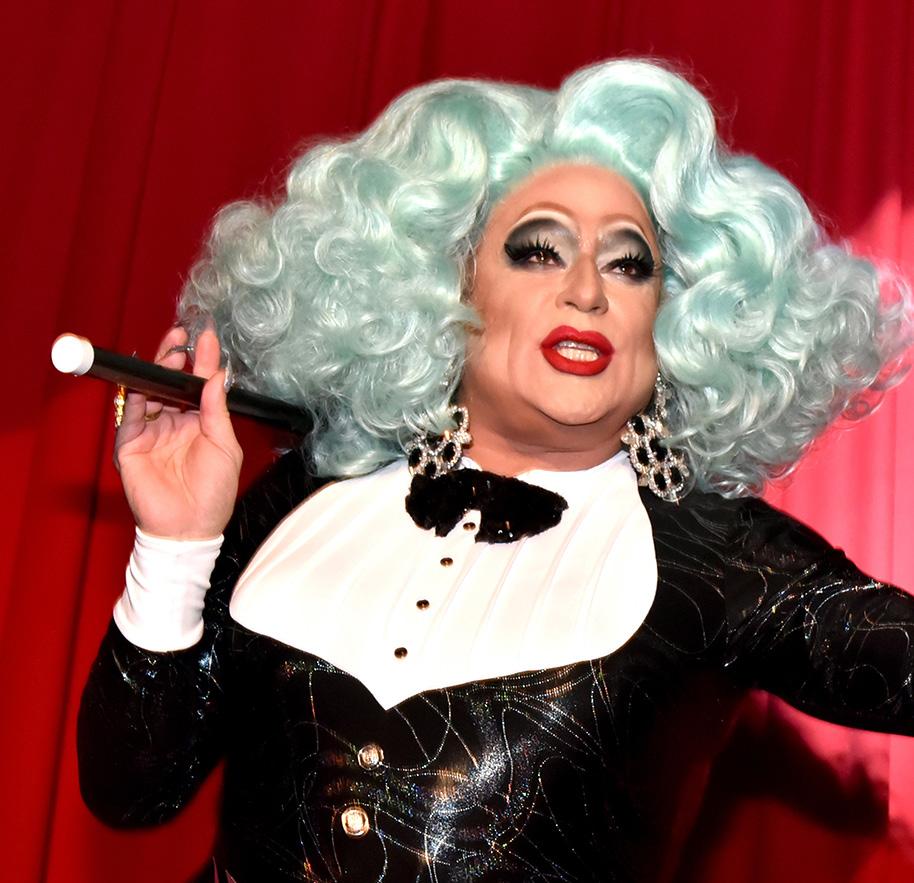
No? OK, fine ...)
Coming from an alternative/ punk ethos more rooted in performance art than traditional notions of “drag,” Heklina created a space that welcomed anyone and everyone, regardless of gender, talent, looks, or notions of what drag was “supposed” to be. Her only requirement was for performers to show up and be fabulous. Few of us realized it at the time, but for a drag show, this was kinda revolutionary. Remember, this was back when being a drag queen pretty much meant you were a gay man impersonating a woman, with sequined gowns and diva lip-syncing. Or, as Heklina put it, “tired.” T-shack changed all that.
And while she may not have known what she was doing at the start, she soon figured it out – and fine-tuned it. She kept things fresh by creating themes for each week’s show. She biked around town hanging up her own flyers. She
did the opening number for nearly every show (at least for many years) but was actually much more of a host and impresario than she was a performer, turning her between-act emceeing into miniature comedy sets. And over the years, she evolved the art of drag, making it incredibly inclusive across the gender spectrum (remember the uproar when Fauxnique, a cisgender woman, won the Miss Trannyshack Pageant?). She broke the traditional mold of drag years before queens in Los Angeles and New York (and the rest of the world) caught on.
Hekkles (as she was known to her friends) had a reputation for being prickly, hard-nosed, and a bitch – but if you’ve ever worked with flaky-ass drag queens and club kids (especially in the 1990s), you’d understand why. While she generously gave so many performers their first shot on stage, to call her a “drag mother” in the traditional sense would probably be a bit of a stretch. She didn’t suffer fools gladly, and she wasn’t one to dole out compliments. Her parenting style was more like, “throw them in the water and see if they can swim.” And trust me, as a performer, you always wanted to please Heklina. Her brutally honest, “take-no-shit” attitude challenged drag artists to raise the bar, especially after the shows moved to the bigger stage at DNA
Lounge, and eventually to Oasis, the venue she co-founded with D’Arcy Drollinger, where she relaunched and re-branded her weekly drag show as “Mother.” She may not have been the mother we wanted, but she was definitely the one we needed.
She was a Master Class in “How To Have A Successful Career In Queer Nightlife.” (Step 1: If you’ve recently become sober, start a project and throw yourself into it.) She knew how to wrangle order from chaos, managing a stage, managing a crowd, putting down hecklers, booking budding queens, assembling trusted crews, promoting shows, emceeing events, following one’s heart – but also always being aware of what actually sells tickets. She was a business bitch at heart, and made no apologies for it. And she did it all with snark, wit, balance – and a hearty trademark cackle – for over 27 years.
She ended Mother at Oasis and semi-retired to Palm Springs literally a month before the pandemic shut everything down, a savvy business move that even she couldn’t have predicted. But for someone “semi-retired,” she still managed to be everywhere, livestreaming and starting a podcast, and then, after things reopened, back on stage and in the clubs with her Daytime Realness party at El Rio, her recent one-woman show “But I Don’t Judge,” and her starring roles in a series of drag parodies, like the “Mommie Queerest” show in London with Peaches Christ, which she sadly never got to do. She was resolutely performing to the very end.
Heklina being gone – especially so suddenly –feels like a sucker punch. She galvanized so many subsets within our LGBTQ culture – the drag, theater, nightlife, and sober communities are all feeling her loss. And while she may have left us way too soon, she made the most of her time here, moving the needle on drag culture, and inspiring two generations of queers.
And if you, like I, miss her trademark cackle, just Google “Heklina ringtone” and you can still buy it. A savvy business bitch, even from the grave. She’s literally having the last laugh.t
Adriana Roberts is the creator and producer of the long-running Bootie Mashup events, as well as a former DJ and performer at Trannyshack. She was also the former art director of the Bay Area Reporter.
8 • Bay area reporter • April 13-19, 2023 t
<< Open Forum
Heklina performed at her last solo show at Oasis in February 2020.
Gooch
Advocates want SF City Hall to rethink lifting of travel ban policy
by Matthew S. Bajko
As lawmakers in other states continue to pass anti-LGBTQ bills, advocates in San Francisco are calling on city leaders to rethink their push to repeal the ban on using taxpayer money to travel to those states and doing business with companies headquartered in them. But their pleas are likely to fall on deaf ears.
Mayor London Breed already signed into law on March 28 an ordinance sponsored by District 11 Supervisor Ahsha Safaí that lifted the ban on city agencies and departments from entering into construction contracts with firms based in the 30 states covered by the city policy known as 12X. The Board of Supervisors had passed the change on a 7-4 vote earlier in the month.
Subsequently, gay District 8 Supervisor Rafael Mandelman in March also introduced an ordinance to repeal the entirety of 12X. Along with Safaí, Supervisors Hillary Ronen of District 9, Catherine Stefani of District 2, and Board President Aaron Peskin of District 3 have signed on as co-sponsors.

The supervisors’ rules committee is expected to hear the full repeal of 12X at its meeting Monday, April 17, which begins at 10 a.m. It is expected to pass, as Safaí serves on the panel along with chair gay District 6 Supervisor Matt Dorsey, who has told the Bay Area Reporter he supports doing away with the travel ban policy in its entirety.
The other committee member, District 10 Supervisor Shamann Walton, spoke up last month in support of 12X and voted against Safaí’s ordinance covering its restrictions on construction contracts. Walton hadn’t responded to a request for comment by the B.A.R.’s press deadline Wednesday but is likely to also vote against Mandelman’s 12X repeal ordinance.
First enacted in 2016 to cover those states that passed discriminatory LGBTQ laws, the 12X policy was expanded in 2019 to include states that restricted abortion, and again in 2021 to include those with voter suppression laws. But with nearly two-thirds of the country now on San Francisco’s banned list, critics have argued it has done nothing to promote liberal causes in other states.
Instead, they contend it has merely hit the city’s bottom line by driving up the costs for various contracts because companies that could do the work less expensively are not bidding on them in the
Loudest voices don’t speak for all
B.A.R. that he and others in the community are calling on the supervisors and Breed to rethink their position on 12X. At the very least, he said, they will be asking the members of the supervisors’ committee next week to postpone taking a vote on Mandelman’s ordinance in order for there to be more public discussion about the issue.
Steven Underhill
San Francisco supervisors are likely to repeal the ban on publicly funded travel to states with anti-LGBTQ laws.

first place if they are located in a banned state. Repeal proponents have also complained it is hampering city officials’ ability to promote the city’s values because they can’t travel to various conferences and other events in the 30 states.
California also has a law banning most taxpayer-funded travel to states that have enacted anti-LGBTQ laws over the last eight years but does not ban contracts with companies in those states. Last month, lesbian state Senate President pro Tempore Toni Atkins (D-San Diego) introduced a bill to repeal the state travel ban with the support of several LGBTQ leaders, though the author of the bill that created the “nofly list,” gay Assemblymember Evan Low (D-Cupertino), has spoken out against doing so. Victor Ruiz-Cornejo, a gay man who is Breed’s adviser on LGBTQ issues, reiterated to the B.A.R. this week her position that it is time for the city to scrap its 12X policy. Particularly in light of the city now projecting a $291 million deficit in its 2023-2024 fiscal year budget that begins July 1, the policy no longer makes fiscal sense to the mayor, he added.
“Mayor Breed honors the spirit of what 12X was attempting to do legislatively to protect and expand the rights of LGBTQ people and ensure San Francisco values were reflected in the organizations we do business with,” said Ruiz-Cornejo. “However, after a few years of seeing it not have the impact of what supporters were hoping for, we are supportive of Supervisor Mandelman’s effort to repeal the legislation, which will help cut bureaucracy in San Francisco. Especially in a tough budget year here, we need to find money to support the services we do value in San Francisco.”
But longtime LGBTQ advocate Brian Basinger, a gay man who has long lobbied city officials regarding fiscal matters and other issues, told the
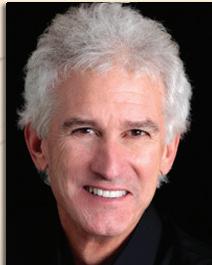
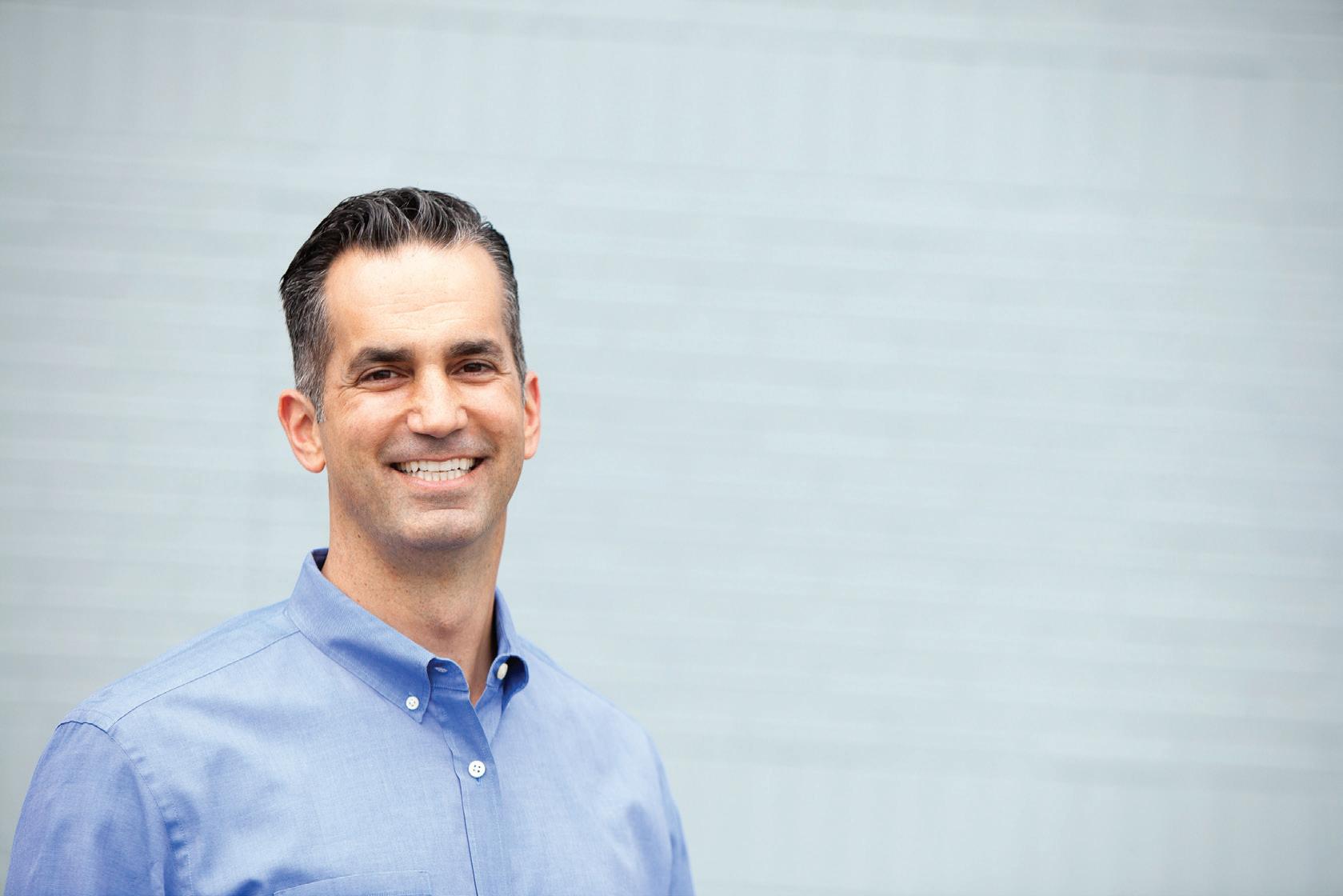
I was disappointed to see the way you portrayed the recent Board of Supervisors land use committee meeting on the Castro Theatre [“Peskin issues ultimatum to Another Planet on Castro Theatre,” April 6]. During the public comment period, 22 people spoke in favor of APE’s plans versus 21 people who spoke in opposition. “Community voices were not all opposed to APE’s plans,” your reporter conceded in the piece. How about saying just over half of public commenters were in support?
There is a small but vocal and well-organized group of individuals repeatedly quoted in these pieces, namely representatives from the Castro Theatre Conservancy and the Castro LGBTQ Cultural District. As a gay resident of the Castro, I’ve asked myself, “Who are these groups and who do they represent?” As the Bay Area Reporter itself reported, only 128 people voted in the last cultural district election, and candidates only needed to win 30% of that vote to get on its board. These groups represent themselves and close allies. They do not speak for all residents, queer people, business owners, and workers in the Castro. I love your coverage of news in our neighborhood. Please make sure you’re engaging a wide array of voices, not just those who are shouting the loudest.
Mike Murray San Francisco
Mourning the loss of queer spaces
I’d like to thank Michael Yamashita for his thoughtful column, “What we lose when a gay bar closes” [Guest Opinion,
“People are ambivalent and need more information on why they are repealing the effort instead of fixing it, or replacing it with something more effective,” he told the B.A.R. Tuesday, having discussed the issue with various stakeholders in recent days.

He also posted to his Facebook page that morning a public call for city officials to alter their approach regarding the 12X policy. Basinger called on both the mayor’s office and supervisors to hit “pause” on their move to repeal it without engaging more fully with the community.
“This is not the time for San Francisco to throw in the towel on its boycott of states that discriminate against LGBTQ+ people, have anti-abortion statutes, and practice voter suppression. It sends the wrong message to our siblings in other states who are under attack,” wrote Basinger. “San Francisco must remain a beacon of hope for those who are taking the gut punch of state-imposed discrimination and just plain mean-spiritedness. The message needs to remain ‘San Francisco’s got your back.’ Not ‘We give up.’”
Basinger had planned to meet with Ruiz-Cornejo along with several other advocates Wednesday morning regarding the issue, but they postponed the meeting for the time being. One idea that had been floated with Mandelman was creating an LGBTQ stabilization fund using the savings from the city reopening its bidding process to protect LGBTQ programs and services from being targeted with budget cuts.
According to a city review of 12X, even though its exact cost “is difficult to quantify,” the Budget and Legislative Analyst had estimated it likely increased the city’s contracting costs “by 10%-20% annually.” Thus, the 10% to 20% in savings from doing away with it could be targeted toward LGBTQ budgetary needs, Basinger had suggested, but the idea has been shelved for now due to a lack of support for it.

While Mandelman had told the B.A.R. the suggestion was “interesting,” he nonetheless said it would be difficult to figure out an exact dollar amount in contract savings and such a fiscal carve out wouldn’t be in place in
March 16]. As an original owner of the Elephant Walk in 1974, I experienced a wave of sadness and nostalgia at Harvey’s closing benefit for its employees. This gathering place was one year shy of a half century at this intersection of renown.
I had migrated to San Francisco from Philadelphia in 1971 and within three years found myself at the crossroads of 18th and Castro streets running a bar and restaurant in the vibrant gayborhood with 25 employees. These were my windows on “Main Street.” And what a view it was! To be a prominent business on such an intersection I joined both the old guard Eureka Valley Merchants Association and Harvey Milk’s newly formed Castro Village Association. I wanted to be as inclusive as possible with the community as well as welcoming to all in the Castro.
My decade at 500 Castro Street was a whirlwind of politics, protests, fun Halloweens, Sylvester, jam-packed street fairs, assassinations, and police riots. Oh, and did I forget to mention, one hell of a ride.
As Yamashita pointed out in his piece, with the passage of decades, societal changes, mostly for the good, gay bars are no longer the essential community spaces they once were. I didn’t want the memory of the Elephant Walk to fade into obscurity and am in the process of making sure that the remaining elephant etched windows are kept in the GLBT Historical Society’s archives.
Thank you, Mr. Yamashita, and San Francisco, for allowing me to leave a piece of my heart at 500 Castro Street
Fred Rogers Oakland, California
Planning Ahead is Simple
Planning Ahead is Simple
The benefits are immense.
Planning Ahead is Simple
The benefits are immense.
The benefits are immense.
When you plan your life celebration and lasting remembrance in advance, you can design every detail of your own unique memorial and provide your loved ones with true peace of mind. Planning ahead protects your loved ones from unnecessary stress and financial burden, allowing them to focus on what will matter most at that time—you.
When you plan your life celebration and lasting remembrance in advance, you can design every detail of your own unique memorial and provide your loved ones with true peace of mind. Planning ahead protects your loved ones from unnecessary stress and financial burden, allowing them to focus on what will matter most at that time—you.
t Politics >>
When you plan your life celebration
you can
your own unique memorial and
your
with
of
Contact us today about the beautiful ways to create a lasting legacy at the San Francisco Columbarium.
serving the LGBT Community. FD 1306 / COA 660 One Loraine Ct. | San Francisco | 415-771-0717 SanFranciscoColumbarium.com
and lasting remembrance in advance,
design every detail of
provide
loved ones
true peace
mind. Planning ahead protects your loved ones from unnecessary stress and financial burden, allowing them to focus on what will matter most at that time—you.
Proudly
Contact us today about the beautiful ways to create a lasting legacy at the San Francisco Columbarium.
serving the LGBT Community.
Proudly
Contact us today about the beautiful ways to create a lasting legacy at the San Francisco Columbarium.
serving our Community. FD 1306 / COA 660 One Loraine Ct. | San Francisco | 415-771-0717 SanFranciscoColumbarium.com The Scott W. Wazlowski Vice President of Advertising advertising@ebar.com 44 Gough Street #302, San Francisco, CA 94103 (415) 829-8937 • www.ebar.com Advertise!
Proudly
Barry Schneider Attorney at Law •Divorce w/emphasis on Real Estate & Business Divisions •Domestic Partnerships, Support & Custody •Probate and Wills www.SchneiderLawSF.com 415-781-6500 *Certified by the California State Bar family law specialist* 315 Montgomery St., Ste. 1025, San Francisco, CA
>>
Letters
See page 12 >>
For 25 years, AsiaSF choreographer has kept the beat
by Matthew S. Bajko
Growing up in San Francisco’s Little Hollywood neighborhood Ronnie Reddick began modeling at the age of 17. He then enrolled at a Black-owned dance school in the city and soon found himself choreographing fashion shows.
“My model friends had dance skills,” recalled Reddick.
He credits his late friend and dancer Gabriel Trupin, who died due to AIDS in 1995, for convincing him that he could also dance professionally. Trupin had performed for a number of megastar singers, most famously as a 19-year-old featured dancer in Madonna’s 1990 Blonde Ambition tour, captured in the film “Truth or Dare.”
“He pushed me to dance. I was very introverted and very shy,” said Reddick.
Yet he was able to break out of his shell to work as a go-go dancer for various dance parties in the city during the 1990s. One of the first people to employ him was DJ Page Hodel for her party at The Box.
Reddick would also perform at the gay dance venues Club Universe, EndUp, and the Trocadero. But as he recalled years later on a podcast, he never received the same attention or tips as his fellow white dancers.
“In the gay community, I did feel very invisible. I wasn’t a body,” explained Reddick on the show. “I was this very lean dancer body, African American kid who dressed to the nines; I was always decked out. I wasn’t naked and not in a G-string or booty shorts and chain link harness. I would wear collars and hats. I wouldn’t get tipped like other guys.”
Reddick, now 59, doesn’t identify as gay or straight, he explained to the Bay Area Reporter over a chicken salad lunch at the Brazilian eatery and coffeehouse Cafe de Casa in the Castro LGBTQ district. Although he eschews defining his sexual orientation, Reddick has been with his partner, Lorenzo Henderson, for nearly 31 years.
The couple live in Vallejo and rarely spend time in the Castro or San Francisco in general. What does draw Reddick across the bay is his work as the choreographer for AsiaSF, the South of Market restaurant and club that features transgender cabaret performers who double as the venue’s waitstaff.
Having opened at 201 Ninth Street
Trans athletes
From page 2
chances to participate because participation in athletics provides many long-term benefits for young people, including important health benefits, and chances to develop leadership skills, discipline, and self-confidence. Given the importance of the opportunity to participate in athletics to students’ educational experience, we look forward to submitting comments and working with the administration to further remove those remaining bigotry-based barriers to full and equal participation by transgender youth.”
But others were critical. Congressmember Cori Bush (D-Missouri), a straight ally, tweeted the proposal was “unacceptable.”
“In the face of a barrage of attacks on trans people, especially trans kids, our trans community is counting on us to have their backs. At no point should we ‘compromise’ on trans rights with transphobic people,” Bush wrote.
DOE referred to reports from stakeholder groups and others that indicate how, in schools, participation in sports serves various social, emotional, physical, and cognitive development, such as learning to work as a team.
“The department finds the work of these organizations on this issue to
the night of Friday, April 17, 1998, AsiaSF’s founders Larry Hashbarger and Skip Young are marking their 25th anniversary this weekend. Reddick came on board as the show choreographer for AsiaSF in October that year and has been with it ever since.
He works with each of the performers on their outfits, song choices, and dance routines. His aim is to create a full show rather than a string of individual lip-synced performances.
“People who know this business will know the difference. But the average person coming in looking for a good time will have no idea this is a choreographed show,” said Reddick. “It is staged. It is not a free-for-all.”
Reddick emphasized that the entertainment put on at the venue is not a drag show. It is more along the lines of a cabaret show, he explained, and all of the performers are transgender individuals.
“We want to elevate lip synching with costumes and choreography. A lot of the girls have performed in the drag world because they didn’t have a trans place to go,” said Reddick.
Unlike at a drag brunch, where the cast will be collecting dollars and other bills from the audience during their performance, Reddick noted that AsiaSF performers don’t stop mid-song to gather cash tips. Customers can tip when given their bill to pay at the end of the performance, he explained.
“We do dance choreography. I don’t like people doing cartwheels, splits or she-bams – death drops,” he said. “I don’t think we are better than drag –I love drag – we are just different. We
be informative to the extent the organizations aim to balance important interests, minimize harm to students whose opportunity to participate on a male or female team consistent with their gender identity would be limited or denied, and take account of the sport, level of competition, and grade or education level of students,” stated the DOE proposal.
“…Youth participation in athletics is associated with many physical, emotional, academic, and interpersonal benefits for students, including increased cognitive performance and creativity, improved educational and occupational skills, higher academic performance and likelihood of graduation from a 4-year college, improved mental health, and improved cardiovascular and muscle fitness, as well as reduced risk of cancer and diabetes, and has the potential to help students develop traits that benefit them in school and throughout life, including teamwork, discipline, resilience, leadership, confidence, social skills, and physical fitness,” stated the DOE proposal.
At deadline, the proposed rule change had not yet been published in the Federal Register. Once it is, interested groups and individuals have 30 days to submit comments for DOE to consider before publishing a final rule change.
are a trans cabaret show.”
He is also deliberate in how he stages each act so it isn’t campy nor does it present the female performers as sex objects, he said.
“AsiaSF celebrates these trans girls for their talent, and I don’t want them to be over sexualized. You don’t need it. It’s sexy already,” said Reddick. “I want it to be polished and glamorous.”

A struggle at times
Achieving those goals over the years has been a bit of a struggle at times, Reddick acknowledged, as sometimes he and the performers have not seen eye-to-eye. There have been arguments over everything from the costumes and songs to the choreography, he said.
A majority of the performers at AsiaSF have been Filipina, which over the years has resulted in some
tension when performers of other races have been hired, said Reddick. Charges of favoritism have also been leveled against him, he said, due to a performer’s misreading his intentions when working with them on improving their portion of the show.
“I don’t have any favorites. I only care if you are on time and doing your job,” said Reddick. “I am very protective of them all.”
At the end of the day, said Reddick, his only concern is that the women of AsiaSF put on the best show they can present for their customers and freshen it up over time to give audiences a reason to come back.
“I want the best for the company. I want the best for these girls. For them to succeed, there has to be a little tough love,” he said.
For as long as he has worked with AsiaSF, Reddick has also been the show director for the Bill Hopkins Rock’n Orchestra. His dance career has also taken Reddick around the world and led him to spend nearly a year in the late 1990s living in South Korea.
The popular singer Lee Seungchul had come to America to audition dancers and ended up meeting Reddick, who had created a dance division with the Stars Modeling Agency He hired Reddick, along with a male and female friend of Reddick’s who were also African American, to perform with him as a hip-hop dancer and be his choreographer.
“It was my only time being a celebrity. We were on commercials or TV shows almost every day,” recalled Reddick, who called the performer “the Elvis of Korea.” “We were treated very well.”
For the last 21 years Reddick has been a senior lecturer at Stanford University teaching about hip-hop. He has also taught in the dance department at Santa Clara University for the past six years.
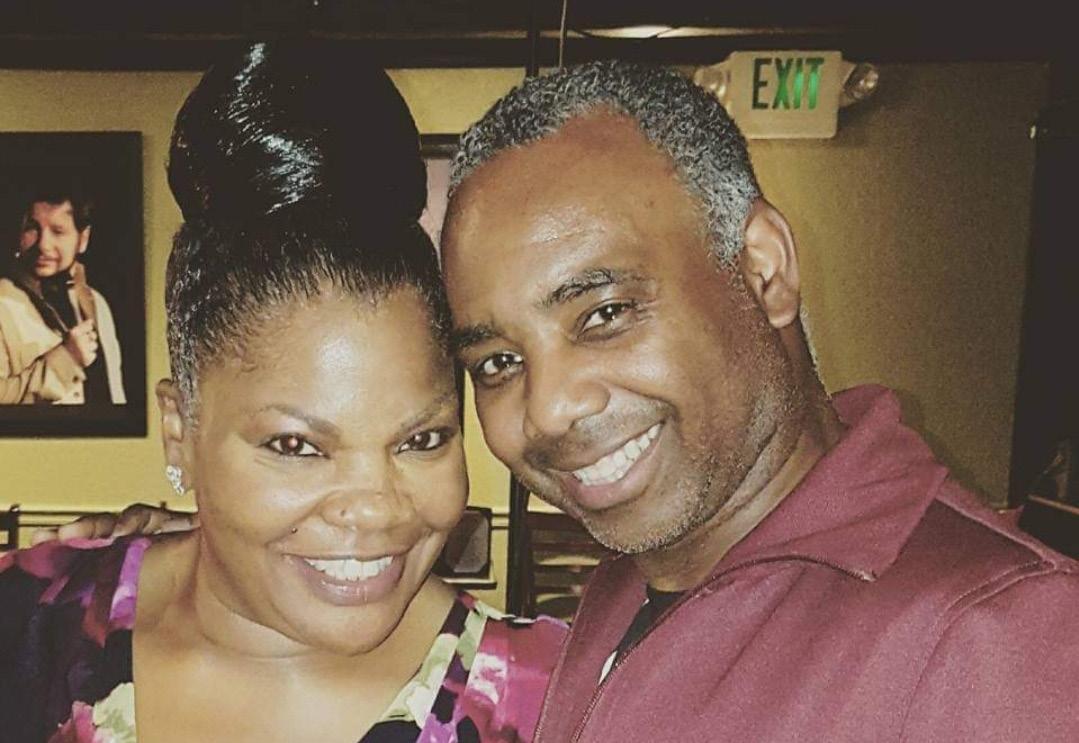
He has worked with various artists during his career, including drag queen RuPaul on several occasions.
Once was when she was cast on the TV show “Nash Bridges” that filmed in San Francisco for an episode in which Reddick was also cast as a contestant in a transgender beauty pageant.
One of his biggest career disappointments came with the shuttering of AsiaSF’s Palm Springs location, which Reddick had helped launch back in early 2020 just as the COVID pandemic began to spread. It closed its doors that March 14 and did reopen in 2022, but the venue closed again that July.
“It was so sad,” Reddick recalled. “Those girls gave me everything.”
The closing number, from the Broadway musical “Dream Girls,” will be reprised during the silver anniversary shows for the San Francisco location that kick off Thursday night and run through an invite-only event on Sunday. Nearly all of the performers who have been featured at AsiaSF have been invited back for the occasion.
“I am bringing the Palm Springs girls in,” said Reddick. “This is the first time we are collaborating with all the girls together.”
For more information about AsiaSF, or to make a reservation online for an upcoming dinner and show, visit https://asiasf.com/.
Honor Roll
The women- and queer-owned bottle shop and wine bar DECANTsf in San Francisco’s South of Market district has been named the LGBTQIA+ Venue of the Year by the Bar & Restaurant Expo. The industry group announced the winners of its 2023 excellence awards during a special ceremony March 29 in Las Vegas.
Sommeliers Cara Patricia and Simi Grewal opened their business, which also doubles as an educational events space, in May 2019 at 1168 Folsom Street near Eighth Street. For more information about the store and bar, including the hours for each, or to order online visit https://decantsf.com/t
Got a tip on LGBTQ business news? Call Matthew S. Bajko at (415) 829-8836 or e-mail m.bajko@ ebar.com.

West Virginia case
A U.S. Supreme Court vote on April 6 temporarily stopped a recently passed ban in West Virginia against transgender athletes. The law is a variation on the numerous laws against transgender students that are being enacted around the country. The West Virginia law requires that public secondary schools and universities bar any student identified as male at birth from participating in a sport designated for female students.
The Supreme Court justices voted 7-2 in West Virginia v. BPJ to reject the state’s request that it vacate a federal appeals court injunction in February that prevented the anti-transgender law from taking effect. The injunction is set to remain in place until the appeals court rules on the constitutionality of the law.
The Alliance Defending Freedom joined the state of West Virginia in its request to vacate the 4th U.S. Circuit Court of Appeal’s injunction. Twentyone states joined a brief supporting West Virginia’s request, including Florida, Georgia, Texas, and Virginia. And a group of 67 female athletes, coaches, and parents, including lesbian tennis legend Navratilova, submitted a brief in support of the West Virginia law.
“At every level, we are aware that less skilled, less determined males beat
higher level female athletes because of innate physical difference in the sexes,” said the group’s brief. “…When women and girls are asked to compete against male athletes, they are asked to ignore biological reality, the reality that defines female physical bodies.”
Justices Clarence Thomas and Samuel Alito, the Supreme Court’s most consistently anti-LGBTQ members, submitted a dissent to the majority’s denial of West Virginia’s request. They said the court is “likely” to take up the issue “in the near future.” Specifically, they said, the issue will be whether Title IX of the Education Amendments of 1972 or the 14th Amendment’s Equal Protection Clause prohibit a state law “restricting participation in women’s or girls’ sports based on genes or physiological or anatomical characteristics.” The dissent also hinted that the majority’s vote may have been based on a procedural matter: that West Virginia took too long – 18 months – before seeking to vacate the lower court injunctions, though that is being contested on appeal.
The West Virginia law was due to go into effect in July 2021, but the American Civil Liberties Union and Lambda Legal Defense and Education Fund filed litigation, BPJ v. West Virginia, to challenge the constitutionality of the law and prevent it from taking ef-
fect. Subsequent to filing the lawsuit, the plaintiff in the challenge has been identified as now 12-year-old Becky Pepper-Jackson.
LGBTQ youth helpline
In related news, White House press secretary Karine Jean-Pierre, a lesbian, announced at her daily briefing April 6 that the administration has also created a special helpline for LGBTQ youth. Using the new National Suicide Prevention Lifeline, a transgender or LGBQ person can call 988 and then press the number 3 to be connected to a counselor who has been specifically trained to help LGBTQ+ youth.
“This has been one of the worst weeks of 2023 so far in terms of antiLGBTQ bills becoming law in states across America,” noted Jean-Pierre. She explained that four states – Idaho, Indiana, Kansas, and North Dakota – enacted anti-LGBTQ bills last week. The Kansas law bans transgender kids from school sports. A total of 14 states currently ban health care professionals from providing genderaffirming care.
“Look, this is awful news. Let’s be very clear about that,” said Jean-Pierre. “LGBTQI+ kids are resilient. They are fierce. They fight back. They’re not going anywhere. And we have their back. This administration has their back.”t
10 • Bay area reporter • April 13-19, 2023 t
<< Business News
<<
Ronnie Reddick is surrounded by the girls of AsiaSF at an Equality California event.
Courtesy Ronnie Reddick
Comedian Mo’Nique, left, joined Ronnie Reddick at an event.
Courtesy Ronnie Reddick
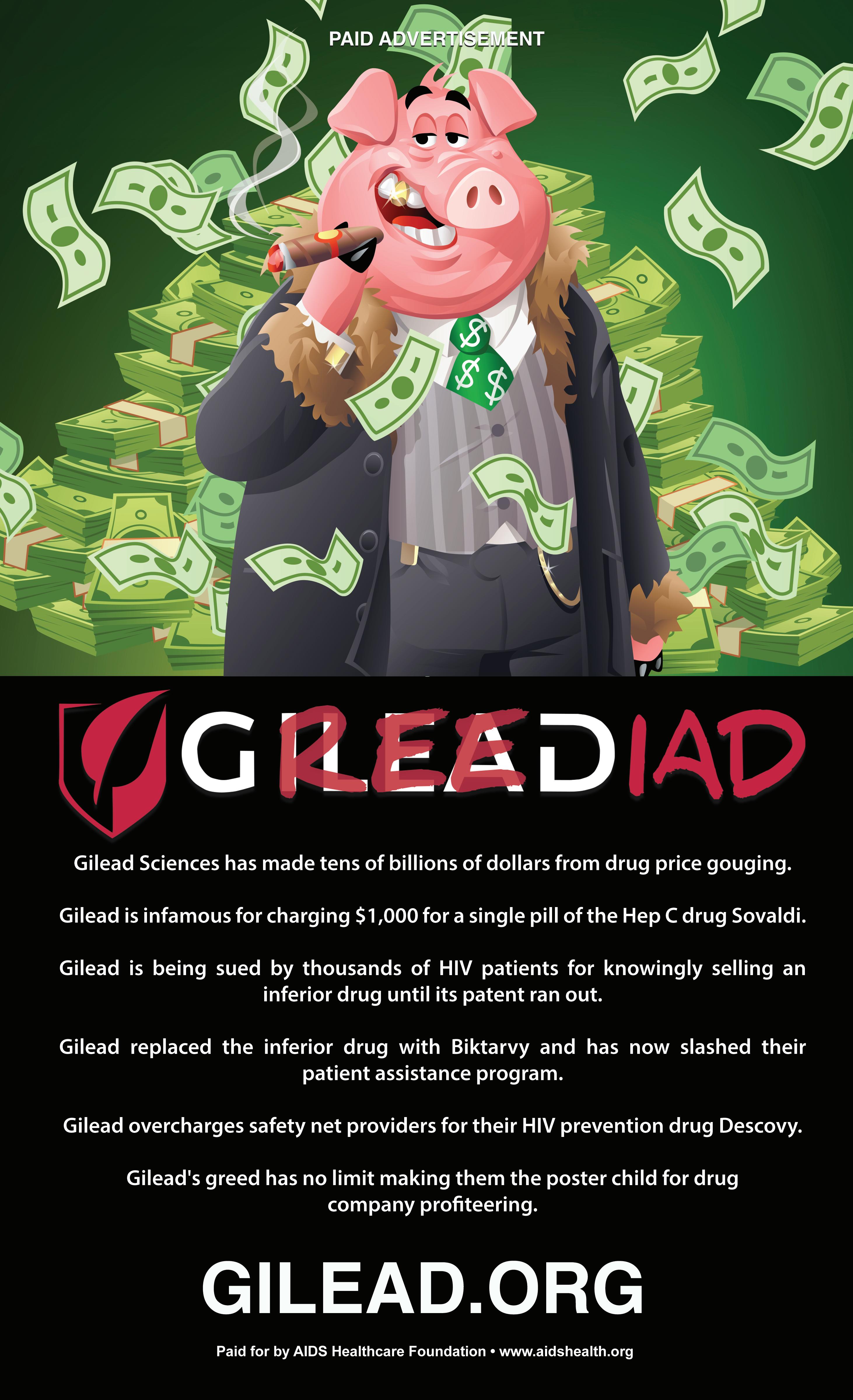
Ugandan prez rejects promoting homosexuality
by Heather Cassell
Ugandan President Yoweri Musev-
eni used a recent two-day conference to call on African countries to save Africa from homosexuality.
Museveni called homosexuality “a big threat and danger to the procreation of human race [sic],” The Guardian reported. He called on his fellow African leaders to reject promoting homosexuality.

The 78-year-old African leader’s actions come two weeks after Uganda’s Parliament overwhelmingly voted 387-2 to pass the Anti-Homosexuality Act, 2023.
Museveni’s actions signaled that he might sign the bill into law after he rejected a similar bill, the Sexual Offences Bill, in 2021. Museveni has 30 days from March 21 to sign or veto the bill.
The bill has also brought anti-gay conservative groups out into the open after nearly a decade of working in the shadows. The Guardian reported that Family Watch International, a U.S. evangelical organization that is on the Southern Poverty Law Center’s hate watch list, sponsored the virtual portion of the two-day inter-parliamentary conference on “family values and sovereignty” March 31 and April 1. Sharon Slater, founder and president of Family Watch International, spoke at the event. Slater also chairs the U.N. Family Rights Caucus lobby group.
The conference was hosted at the State House in Entebbe and was attended by Uganda’s members of parliament and delegates from 22 African countries, including Kenya, Sierra Leone, and Zambia. The event was promoted by the Ugandan parliament, the African Bar Association, and the Nigerian-based Foundation for African Cultural Heritage.
The revival of Uganda’s Anti-Homosexuality Bill criminalizes LGBTQ people for simply existing and enforces life imprisonment for anyone caught having gay sex (male or female). Youth engaging in gay sex get three years in prison and a rehabilitation period. The law turns family, friends, and neighbors against each other to report suspected LGBTQ people into authorities. It brings back the death penalty for “aggravated homosexuality,” which includes gay sex with minors or if the perpetrator is HIV-positive, among other categories. The law includes stiff fines, such as imposing 1 billion Ugandan shillings ($264,000) for promoting homosexuality.
The conference occurred while U.S. Vice President Kamala Harris was touring Africa on a diplomatic mission March 26 to April 1.
Harris raised the issue of LGBTQ human rights while completing the U.S.’s multimillion-dollar security deal during her tour. Harris and her husband, second gentleman Doug Emhoff, visited ahead of President Joe Biden’s plans to travel to Africa this year, reported the Washington Post.
The Washington Post’s editorial board suggested that Biden should “emphasize that LGBT rights are human rights” and to “reward” and “showcase” African countries, like
<< Political Notebook
From page 9
time to affect this year’s budget talks. He also noted the 12X policy no longer covers just LGBTQ issues but also reproductive rights and minority voters being disenfranchised.
“Different claims can be made on the savings,” said Mandelman, “and we are not really going to know how much we are saving.”
Nonetheless, Mandelman said he shares the budgetary concerns LGBTQ leaders like Basinger and several executive directors of local LGBTQ nonprofits have raised with him in recent weeks. He pledged to be advocating for the needs of the LGBTQ community as the mayor and supervisors work to produce a balanced budget by
South Africa and Botswana, that have upheld LGBTQ rights and decriminalized homosexuality rather than “reward” anti-gay countries with a presidential visit.
“In the face of such blatant discrimination, staying silent is not an option,” the editorial board wrote.
The goal of Harris’ trip was to shore up U.S. and African relationships like other diplomatic visits made by U.S. officials, to fend off China and Russia’s investments in Africa and Asia, and pledge financial support. However, LGBTQ human rights were very much an undertone throughout Harris’ trip. She addressed the issue diplomatically at a March 27 news conference with Ghana President Nana Akufo-Addo.
Responding to a reporter’s questions about LGBTQ rights, standing next to Akufo-Addo at a news conference in Accra, Harris recalled her long history of fighting for equality and human rights, including LGBTQ rights.
“I feel very strongly about the importance of supporting the freedom and … fighting for equality among all people and that all people be treated equally,” Harris said, stating that she considers LGBTQ rights a “human rights issue.”
“That will not change,” she said. Harris did not mention Ghana’s proposed anti-LGBTQ bill. Ghana was the only point in her trip where she publicly spoke out on behalf of LGBTQ rights in Africa.
Ghana
The tour came at a critical time for Africa’s LGBTQ community, which has been increasingly under attack by government leaders. Ghana, Kenya, Tanzania, Uganda, and Zambia have been cracking down on LGBTQ rights for the past two years. The countries stepped up attacks a month before Harris’ visit. All five countries have been legislating stricter anti-gay laws and include banning books about LGBTQ subjects.
According to the Human Dignity Trust, 67 countries around the world criminalize homosexuality. Of those countries, 11 have jurisdictions that impose the death penalty. Additionally, 41 of those countries criminalize lesbianism and 14 criminalize transgender or gender-nonconforming people.
The Post’s editorial board noted that “Africa forms a near-unanimous block of intolerance,” with at least 32 of the countries that criminalize homosexuality located on the continent. Exceptions include South Africa, Angola, Botswana, Mozambique, Lesotho, and Seychelles.
The final draft of Ghana’s bill, the Promotion of Proper Human Sexual Rights and Ghanaian Family Values Bill, was presented by a bipartisan group of members of parliament to the plenary April 3.
The bill was introduced in 2021. It was in a parliamentary committee. Akufo-Addo told reporters Ghana’s attorney general, Godfred Yeboah Dame, spoke with the parliamentary committee “regarding the constitutionality” and “several of its provi-
their deadline to do so this summer.
“I think there will be a lot of queer populations we are going to be needing to be very attentive to in an environment of scarcity,” said Mandelman, who is serving this year on the board’s two budget committees. “With last week’s budget forecast, it’s getting darker and darker. People are seeing the writing on the wall and are seeing what they need to do to protect their people.”
Meanwhile, Basinger is arguing that more conversations are needed in order to find some consensus on how to either fix the city’s boycott policy or replace it with something more effective.
As he wrote in his Facebook post, “What we do not need is to throw in the towel right now without a meaningful plan to achieve the goal of countering these anti-gay, anti-women, and anti-people of color attacks.”t
Courtesy Soft Power News
Ugandan President Yoweri Museveni spoke to Ugandan members of parliament and delegates from 22 African countries at a recent conference hosted at the State House in Entebbe, Uganda.
sions,” reported Pink News.
“My understanding ... is that substantial elements of the bill have already been modified as a result of the intervention of the attorney general,” but it “hasn’t been passed,” Akufo-Addo told reporters, according to CNN.
The bill was introduced to Ghana’s parliament following the raid on the country’s first LGBTQ center right after it opened in 2021, the B.A.R. previously reported. The raid and the proposed bill caused an international outcry.
Ghanaian Member of Parliament Samuel Nartey George, who is the originator leading the charge with the bill, told News 360 that the bill has not been “substantially changed” and remains “rigid and tough.”
Like Uganda’s current anti-gay bill, LGBTQ Ghanaian activists say that country’s bill will make living in Ghana tougher for queer Ghanaians if parliament passes it.
“It’s going to make it difficult for the [LGBTQ] community to exist. They are just trying to erase the community through this bill, so it will definitely lead to an increase in attacks,” Danny Bediako, who runs Rightify Ghana, one of Ghana’s LGBTQ organizations, told CNN.
Bediako said Rightify Ghana has documented 27 cases of violent attacks against LGBTQ Ghanaians so far this year. He added that violent groups are widespread, warning if the bill passes the situation for queer Ghanaians will get worse.
Kojo Oppong Nkrumah, Ghana’s information minister, told CNN the bill may differ from its original draft after the 275 members of parliament debate it clause by clause.
“[It] may end up being different from what was proposed,” he said, pointing out that the lawmakers could “make it harsher or less harsh … it is in the hands of parliament now.”
Ghana Web reported that Kwame Anyimadu-Antwi, the chairman of the Constitutional, Parliamentary, and Legal Affairs Committee, raised his
doubts about the implementation of the bill, stating that it will be challenging to enforce. He also cited that Ghana already has a law that criminalizes gay sex and other issues the bill seeks to strengthen.
Gay sex is illegal in Ghana. The former British colony retained the colonial-era law when it became independent in 1957 and joined the Commonwealth.
It’s anticipated that the final bill will be sent to Akufo-Addo’s desk to sign or veto sometime later this year.
Harris announced the U.S.’s $100 million pledge to Ghana and Benin, Guinea, Ivory Coast, and Togo and an additional three-year $86 million commitment to support a 10-year plan to implement the U.S. Strategy to Prevent Conflict and Promote Stability, during her March 27 meeting with AkufoAddo. The financial aid to Ghana is on top of the U.S.’s $139 million in bilateral assistance planned for the West African country in 2024, reported Reuters.
Uganda
American conservatives provide about $2 billion in collective wealth annually to Uganda’s evangelical organizations, according to Borgen magazine. More than 20 U.S. Christian organizations have pumped more than $50 million into Africa since 2007 to 2020, reported openDemocracy. At that time, Uganda’s original kill the gays bill battle hit a wall with Uganda’s Constitutional Court, which struck it down in 2014 due to a technicality.
Uganda’s journey to legislate hate has been long. It has involved Uganda’s poor and embattled LGBTQ community rising up and fighting back against American evangelicals and the conservative religious country’s political leaders for more than 15 years.
The anti-gay organizations stayed relatively out of the limelight after 2014, but they did not abandon their mission, the New York Times noted.
“They have been working very meticulously over the last five years in mobilizing a constituency, fanning public sentiments, in spreading misinformation as the basis for this law,” Nicholas Opiyo, a Ugandan lawyer and human rights activist, told the Times.
Since 2014, local leaders and groups have fed anti-gay sentiment in Uganda. The East African country has been teeming with attacks on its LGBTQ community. The B.A.R. has reported that LGBTQ Ugandans have suffered multiple raids in bars and its annual Pride parade twice, along with the attempts to resuscitate the kill the gays bill without success.
The country’s passage of the new Anti-Homosexuality Bill follows its restrictions on HIV/AIDS services and Museveni’s anti-LGBTQ-fueled reelection campaign in 2021.
In 2022, Uganda’s government denied Sexual Minorities Uganda to le-
gally register its organization. SMUG is the umbrella LGBTQ organization for a coalition of queer organizations in Uganda.
In 2017, SMUG lost its case against American evangelical Scott Lively in a U.S. court. Lively played a key role in the 2009 kill the gays bill. The case wasn’t moved forward on jurisdictional grounds because the incidents happened in Uganda, not Springfield, Massachusetts, where the trial was held, ruled Judge Michael Ponsor. However, Lively did not leave the courtroom without a stern word from Ponsor, who strongly denounced Lively’s involvement in Uganda’s anti-gay bill, reported Human Rights Watch. SMUG and Lively’s appeals were denied in 2018.
Lively denied supporting Uganda’s kill the gays bill in an email responding to the B.A.R.’s request for comment April 7.
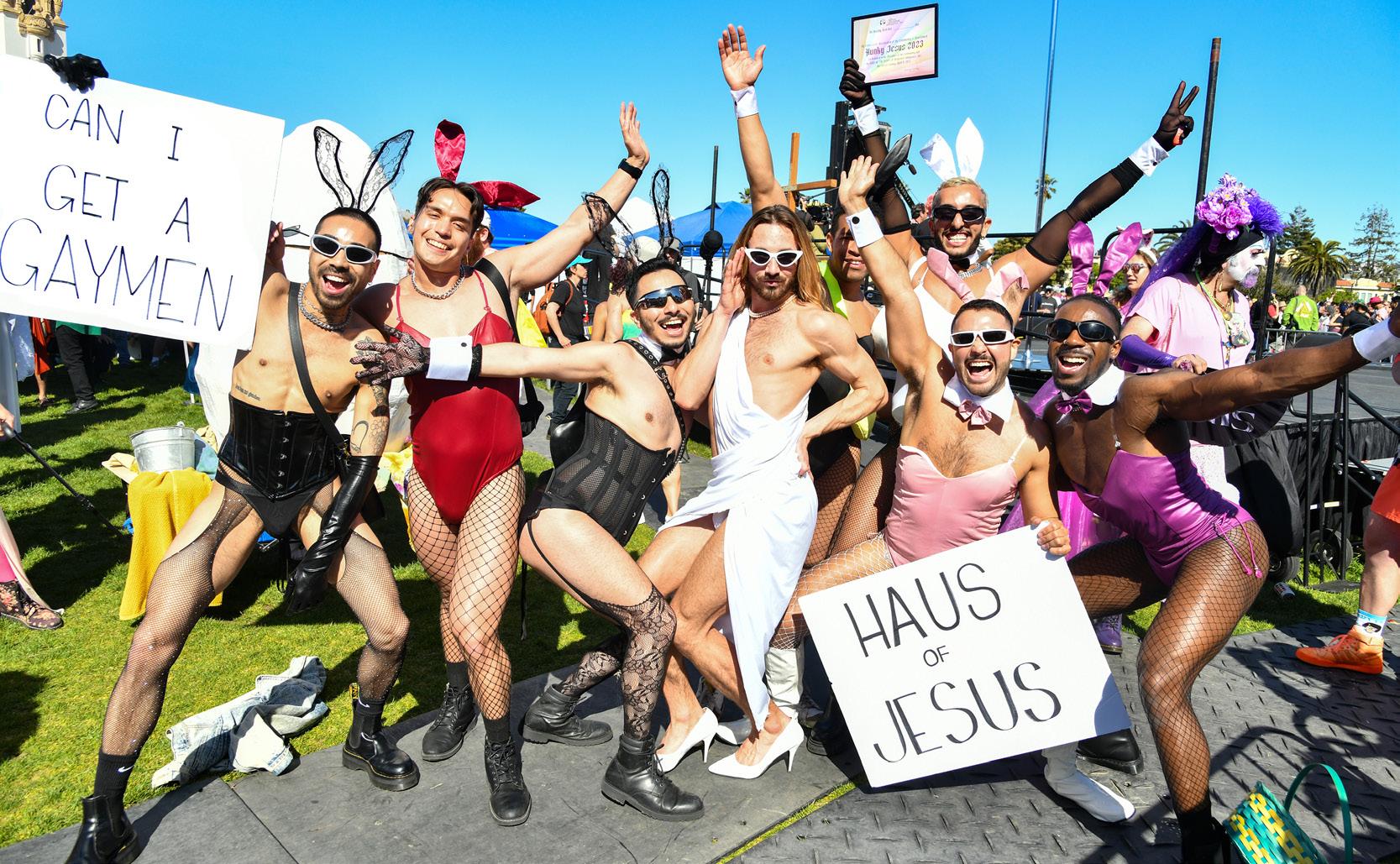
“While I share the majority African belief that mainstreaming LGBT ideology and practices destroys the natural-family eco-system that keeps society healthy, I have always opposed the Ugandan Anti-Homosexuality Act in all of its forms as excessive and unmerciful,” he wrote. “I (unsuccessfully) urged the Ugandan legislature to focus on prevention and rehabilitation rather than punishment when they first drafted this law in 2009.”
He added that if he were to have any influence in the process today, he would simply advise a “Don’t Ask, Don’t Tell”-style bill.
“I would have them scrap that law and produce something like a societywide ‘Don’t Ask, Don’t Tell’ [bill] that preserves the primacy of the natural family while allowing those who choose to live outside the mainstream to do so in discrete, protected subcultures. I think that’s the only workable compromise.”
The law hasn’t been enacted, but it has unofficially taken effect. Uganda’s LGBTQ activists reported that police arrested 12 people for allegedly “practicing homosexuality” in two separate incidents within the past two weeks, reported Al Jazeera.
A teacher is awaiting trial after being arrested for allegedly “grooming” young girls into “unnatural sex practices,” reported Reuters. She was charged with gross indecency and is awaiting trial.
“The LGBTQ community has basically been told, you can’t raise your head, you can’t be seen, you can’t be heard,” Ugandan gay activist Richard Lusimbo told NPR. He added that “what’s happening in Uganda is not just in isolation.”t
Got international LGBTQ news tips? Call or send them to Heather Cassell at WhatsApp/ Signal: 415-517-7239, or oitwnews@gmail.com.

Hunky Jesus is in the haus
a Choice” Mary for the Foxxy Mary contest, Carmen Miranda for best Easter bonnet, and Bruce Beaudette was a runner-up in the bonnet contest.
12 • Bay area reporter • April 13-19, 2023 t
<< International News
The ensemble group Haus of Jesus won the Hunky Jesus contest at the Sisters of Perpetual Indulgence’s annual Easter party in Mission Dolores Park Sunday, April 9. The sunny weather meant a huge crowd of about 10,000
enjoyed the springtime festivities. Other winners were “I Had
Gooch
SF’s Bearrison Street Fair set to return this fall
compiled by Cynthia Laird
The Bears of San Francisco and the Sisters of Perpetual Indulgence will hold the third annual Bearrison Street Fair Saturday, October 14, in the city’s Leather & LGBTQ Cultural District in the South of Market neighborhood.
Attendees will enjoy this year’s theme “Under the Big Tops,” with music, food, competitions, and more, a news release stated. “Experience a circus-like day of hirsute (and hirsuteoptional!) merriment for all bodies, all shapes, all sizes, and importantly – all identities,” the release stated.
The Sisters and BOSF’s goal for the street fair is an inclusive event for adult members of the LGBTQ+ community by promoting body positivity and cultural diversity for all, fostering a supportive and welcoming bear scene, organizers added.
New for this year is an increased fo cus on burly entertainment, attendee competitions, and new activities, building off the fan-favorite wrestling stage and the buns-out deadlift com petition, the release noted. Local and national DJs, performing artists, local vendors, fair merchandise, and VIP goods and services will be on hand as in previous years.
“Each year Bearrison Street Fair gets bigger and better, which consider ing our name and goals, makes sense,” quipped fair co-chair and BOSF board chair Erik Greenfrost.
Added Sister Desi Juana Dewitt, “We’re amping up all of the crowdpleasing features of years past and turning this year’s fair into a circus, one where attendees are the animals! We celebrate individuality, and, most importantly, consent.”
More information and opportuni ties to get involved will be announced soon on the street fair’s website at be arrison.org. People can also follow @ BearrisonSF on Instagram and Twitter for updates.

Ball Masque XX to benefit RWF’s Ukraine fund
Krewe de Kinque’s Bal Masque XX will be held Saturday, April 15, from
People had fun at the Barbells, Bears, and Butts Deadlift competition that was part of last year’s annual Bearrison Street Fair produced by the Bears of San Francisco and the Sisters of Perpetual Indulgence.
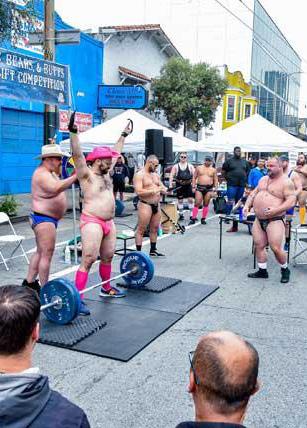
20th anniversary this year. The party’s king and queen – Mark Hankins Jr. and Tawdry Hepburnn, respectively – noted that the event’s theme is “The 415,” and will have a spectacular San Francisco costumed tableaux show and festive décor. DJ Sergio Fedasz and “hot go-go dancers” will bump up the party, the release stated.
A new king and queen will be crowned at night’s end.
Attendees must be 21 and over with photo ID. Tickets start at $10. If people can’t go but still want to help Rainbow World Fund, an LG BTQ humanitarian nonprofit, they can donate to the Ukraine fund at https:// bit.ly/3ZWHYRj.
Dining Out for Life coming up Dining Out for Life, which
be an ambassador and be paired with a restaurant, encouraging their network of friends or family to dine or order from the eatery and collecting tips online. Diners can enter a sweepstakes on the event’s website.
For a list of participating restaurants and more information, go to https://bit.ly/3UqAPrg

Pelosi encourages high schoolers to enter art competition
Congressmember Nancy Pelosi (D-San Francisco) has announced entries are being accepted for Artistic Discovery, the Congressional Art Competition. This nationwide high school arts competition gives congressmembers an opportunity to celebrate and showcase
the country, the release stated. The winning artwork is also featured on House.gov’s Congressional Art Competition page.
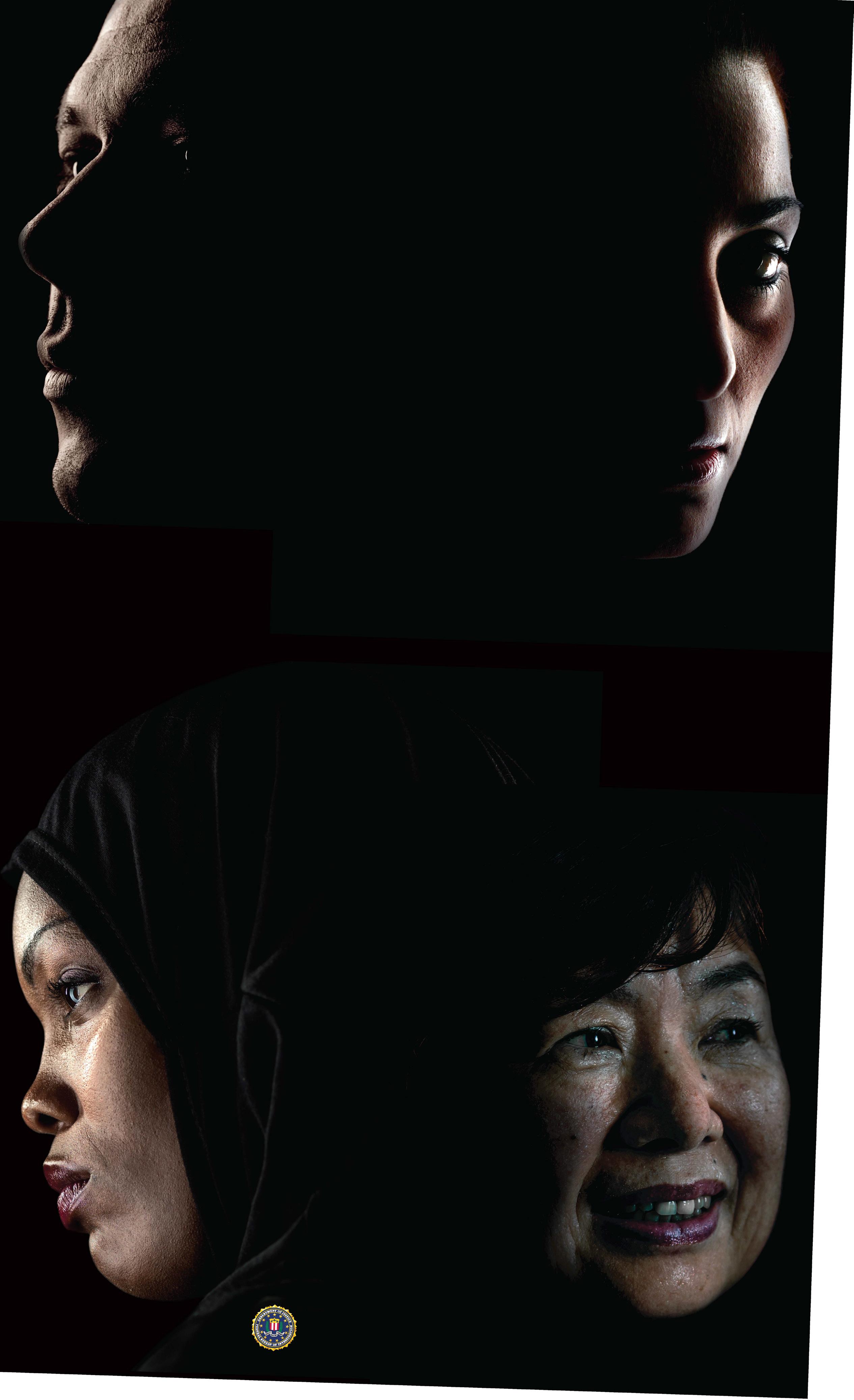
Artwork entered in the contest may be up to 28 inches by 28 inches, may be up to four inches in depth, and not weigh more than 15 pounds. If a student’s artwork is selected as the winning piece, it must arrive framed and must still measure no larger than the above maximum dimensions.

Art that can be entered includes paintings (oil, acrylics, and watercolor); drawings (pastels, colored pencil, pencil, charcoal, ink, and markers. It is recommended that charcoal and pastel drawings be fixed); collages (must be two-dimensional); prints (lithographs, silkscreen, and block prints); mixed media (use of more than two mediums such as pencil, ink, watercolor, etc.); computer-generated art; and photogra-
Tomas was an East Los Angeles native and came to the Bay Area in 1970 to attend St. Mary’s College in Moraga. He received a bachelor’s degree in Latin American studies, was active in the Chicano student movement, and demonstrated a lifelong interest in social justice.
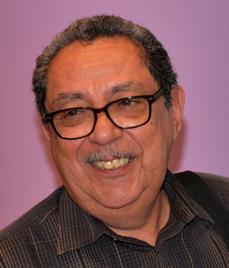
After graduating from college, Tomas worked as a waiter in Yosemite National Park and then moved to San Francisco in the late 1970s. He was active in the lesbian/gay and union democracy caucuses within the Hotel and Restaurant Workers Union Local 2 and subsequently held a number of positions within the hospitality industry. Tomas served as board president of the Mission Community Cultural Center for Latino Arts. He volunteered for Access, a reproductive rights advocacy organization, organized neighborhood tree plantings in the Mission and Glen Park neighborhoods, and participated in an early people of color AIDS civil disobedience action. He was an excellent cook and a San Francisco Giants fan. Tomas traveled extensively and spent a year touring Latin America.
Tomas is survived by his partner Rodney; nephews Jim Jr., Michael, and Matthew; godchildren Ceirin and Chiah; and numerous grandnieces and grandnephews. He will be remembered as someone who lived life to the fullest.
April 13-19, 2023 • Bay area reporter • 13 t STOP THE HATE! If you have been the victim of a hate crime, please report it. San Francisco District Attorney: Hate Crime Hotline: 628-652-4311 State of California Department of Justice https://oag.ca.gov/hatecrimes The Stop The Hate campaign is made possible with funding from the California State Library (CSL) in partnership with the California Commission on Asian and Pacific Islander American Affairs (CAPIAA). The views expressed in this newspaper and other materials produced by the Bay Area Reporter do not necessarily reflect the official policies of the CSL, CAPIAA or the California government. Learn more capiaa.ca.gov/stop-the-hate. Stop-The-Hate-4x10.indd 1 8/24/22 12:53 PM
Community News >>
>>
H. Ramirez
6, 1951 – March 26, 2023
H. Ramirez passed away in
vada due to
related complications.
Obituaries
Tomas
December
Tomas
Reno, Ne-
AIDS-
Gooch
The crowd of protesters swelled from a few hundred to nearly 5,000, filling up Powell Street as people flowed into Union Square for the rally that ended at 3 p.m.
As the marchers left San Francisco’s Civic Center at 11:45 a.m. and walked down Market Street to Union Square they chanted, “Trans rights are human rights,” and “Drag Up! Fight Back!” Rainbow and transgender flags waved in the air among the protest signs reading “Disarm Hate,” “Drag is not a crime,” “Protect trans youth,” and “Say gay, we will not be silenced.”
Demonstrators also remembered Heklina, the late drag star and former co-owner of the Oasis nightclub in San Francisco’s South of Market district. Stefan Grygelko, who was behind the drag persona Heklina, died unexpectedly at age 55 in London April 3, as the Bay Area Reporter previously reported. People carried posters with her image and she was mentioned in speeches throughout the afternoon.
Speakers at the rally discussed the hundreds of anti-LGBTQ bills in state legislatures across the country and two in Congress, the need to pay attention to what lawmakers are proposing, speak up, get involved, stand up for the LGBTQ and other marginalized communities, and vote.
A sprinkling of bewildered onlookers along Market Street stopped to watch the demonstrators as they passed by. Some tourists and shoppers looked askance from the street, shops, and their room windows looking down on Union Square from the Westin St. Francis hotel, while others joined the demonstration and enjoyed the drag shows.
Addressing the crowd, gay California state Senator Scott Wiener (D-San Francisco) called the anti-LGBTQ legislative tsunami a “huge threat to our community.”
Others were critical of conservative lawmakers.
“A war has been declared on us, the LGBT community by the radical right-wing of this nation,” said Nicole Murray Ramirez, a gay Latino San Diego community leader and columnist of a local LGBTQ newspaper.
Murray Ramirez, as the Queen Mother I of the Americas and Nicole the Great, is the titular head of the Imperial Court System, the philanthropic drag organization that began in San Francisco in 1965.
On Easter Sunday, about 2,000 people marched in West Hollywood in a similar drag march organized by the Los Angeles LGBT Center.
Under attack
Currently, more than 450 antiLGBTQ bills have been proposed in various state legislatures, according to the American Civil Liberties Union. Transgender youths’ right to privacy, health care, sports, and information are the targets in more than 150 of those bills, according to the Human Rights Campaign.
The bills are a multipronged assault on the LGBTQ community, attempting to limit changing governmentissued identification, access to services and public accommodations, blocking transgender students from playing sports, and censoring free speech and expression, as the B.A.R. has reported.
An anti-trans bill in California would have forcibly outed trans students to their parents. But Assembly
Bill 1413, sponsored by Assemblymembers Bill Essayli (R-Riverside) and James Gallagher (R-Chico) was effectively killed April 10 when Assembly Education Committee Chair Al Muratsuchi (D-Los Angeles) held the bill, preventing it from having a committee hearing. (See related story.)
Under the Democratic controlled Legislature, the bill had no chance of being passed. Nonetheless, statewide LGBTQ rights group Equality California praised Muratsuchi’s decision.
“The state should play no part in right-wing attempts to vilify trans people and further inflame the never-
ending culture war. We must enact policies that will protect truly trans youth and help to ensure they have every opportunity to succeed,” stated EQCA Executive Director Tony Hoang, calling the proposed bill “misguided” and supporting a “dangerous narrative.”
Last month, two anti-transgender bills were proposed in Congress, House Resolution 5, “The Parents Bill of Rights Act,”, and HR 734, “The Protection of Women and Girls in Sports Act.” A committee in the GOP-led House passed the bill March 9, reported Gay City News.
In 2022, governors signed 29 antiLGBTQ bills into law, according to HRC.
Tennessee became the first state to potentially ban drag performances with the February 9 passage of SB 3. Recently, however, United States District Court Judge Thomas Parker in Memphis blocked the law from taking effect, stating that it was too broad. Parker then extended the injunction until May 26, reported Pink News. While the Tennessee bill does not specifically mention drag, civil rights organizations are wary, as are many drag performers.
“Anti-LGBTQ+ extremists have put drag performers and the establishments that support them in their sights this year, with multiple bills filed across the country seeking to ban and, in some cases, criminalize drag performances. These far-right figures claim that drag is dangerous to children –not gun violence (the leading cause of death for children and teenagers), child hunger, or affordable housing – but drag,” EQCA communications director Jorge Reyes Salinas said in a statement to the B.A.R. “This is a direct assault on free speech and an attempt to intimidate the LGBTQ+ community.”
EQCA co-sponsored the Drag Up! Fight Back! demonstration and rally.
“Drag is an art form that is valued, cherished, and will not be silenced,” Reyes Salinas said.
“RuPaul’s Drag Race” creator RuPaul took to Instagram last month calling Republican lawmakers “bullies” who weren’t solving real issues they were elected to solve from poverty to gun control. He urged people to register to vote.
“Register to vote so we can get these stunt queens out of office,” RuPaul said in the post.
Wiener agreed. Speaking to the crowd Saturday, he said, “Let’s be clear about why they’re doing this. They don’t want to talk about the fact that children are getting shot and killed in classrooms in this country. They don’t want to talk about [how] so many people are dying of drug overdoses because of lack of access to health care. They don’t want to talk about the climate emergency or income inequality or any of the real issues that are facing our country. What do they want to talk about? That drag queens and trans people are somehow the biggest threat to this country.
“We’re not gonna let them get away with it,” he continued, praising transgender youth for their bravery to live authentically and the drag artists who have been fighting for LGBTQ rights for a century. “Don’t mess with the drag queens.”
Attention needed
Lesbian El Cerrito City councilmember Carolyn Wysinger, former board president of San Francisco Pride, told the crowd the reality is that rightwing Republicans, including LGBTQ GOPers, are in it for the long haul.
“We have to understand this ... is a long game that the right-wing Republicans are playing,” she said, stating people need to pay attention to “the boring shit” – policy work. “[Republicans] didn’t just get people on the ballot or just get someone to [the] Supreme Court to overturn Roe v. Wade. They played a long game.”
Republican former President Donald Trump was able to appoint three members to the Supreme Court during his term, solidifying a conservative supermajority.
Wysinger explained California has its deep red districts that Wiener and other out lawmakers in California’s Legislature are fighting against every day in Sacramento.
“Every day they’re going into the halls of justice and having to explain to people from red areas why trans lives matter, why we need to pass antiLGBTQ discrimination laws,” she said about the LGBTQ legislators.
She, along with other speakers, called upon the people at the rally to do more.
Standing up
Only a handful of lawmakers, mostly Democrats, have spoken out against the anti-LGBTQ bills in their state legislatures and fewer governors have vetoed them. Kentucky Governor Andy Beshear (D) vetoed SB 50, the state’s ban on gender-affirming medical care for transgender youth, only to have his GOP-controlled legislature override his veto March 29. The bill goes into effect in late June.
Rebecca Blankenship, a trans woman who’s a member of the Berea school board in Kentucky, and Louisville state Representative Pamela Stevenson (D) have also been speaking out opposing Kentucky’s anti-transgender bills, reported WKYT. Stevenson delivered a fiery speech against HB 470, which banned gender transition services and
more in Kentucky, on the floor of the legislature with demonstrators cheering and chanting in the background.
Nebraska State Senator Machaela Cavanaugh (D-06), the mother of a transgender son, is among those who have also stood up against hateful legislation against the LGBTQ community using her filibuster power. Cavanaugh has been busy filibustering every bill introduced in the legislature to get her point across. Nebraska’s LB 574 would prevent gender-affirming care for transgender youth, reported Good Morning America 3.
“If this Legislature collectively decides that legislating hate against children is our priority then I am going to make it painful, painful for everyone,” Cavanaugh told lawmakers in Nebraska’s legislature, “because if you want to inflict pain on our children, I am going to inflict pain upon this body.”
She also announced the new political action committee, Don’t Legislate Hate, launched along with bisexual Senator Megan Hunt (D-8) and gay Senator John Fredrickson April 3. Hunt is also the mother of a transgender son.
President Joe Biden has spoken out against the laws on several occasions. On April 6, the Biden administration proposed changes to Title IX focused on transgender student athletes’ eligibility for teams, the B.A.R. reported.
Been there, done that
At the San Francisco rally, lesbian activist Olga Talamante and other activists like Murray Ramirez, shared their more than 75 years of experience fighting for LGBTQ and other marginalized communities’ rights and gave a brief history lesson.
Talamante was a San Francisco Pride grand marshal in 2012, the B.A.R. previously reported.
Born in 1935, Murray-Ramirez told the crowd that he survived the fear of being hospitalized and subjected to electric shock and lobotomy, decades of political and legislative attacks, riots, and racial and homophobic and anti-transgender slurs being hurled at her not only by straight people but also by LGBTQ people.
“I come from the times, and listen closely, when – with just a stroke of a pen of your parents or a judge – homosexual Americans were not only committed to state hospitals, but they were subjected to electric shock treatment and lobotomies never to return the same,” Murray Ramirez said.
Murray Ramirez recalled the “Lavender Scare” of the 1950s under thenPresident Dwight D. Eisenhower. The witch-hunt against LGBTQ federal employees remained in place for decades. There was also the “Red Scare” led by then-senator Joseph McCarthy (R-Wisconsin), a national campaign against alleged members of the communist party.
It’s estimated between 5,000 and 10,000 federal employees lost their jobs during the Lavender Scare, reported Time. Similarly, thousands of government employees to Hollywood’s biggest names were black listed during the
Red Scare, including LGBTQ people.
The 1970s brought American singer and beauty queen Anita Bryant’s “Save the Children” campaign and conservative Baptist televangelist the Reverend Jerry Falwell’s anti-LGBTQ campaign. Murray Ramirez fought against California’s Briggs initiative, a 1978 statewide ballot measure that would have banned gays and lesbians from teaching in public schools. It was defeated by voters.
Talamante said that she survived being a political prisoner in Argentina for 16 months. She said laws attacking and dehumanizing activists, students, and others is how Argentina’s brutal military rule started in the 1970s.
“Then came the unleash of the most brutal repression,” where people were disappeared, imprisoned, executed, and children were taken away from their families, she said. To this day, children as adults are still being found and reunited with their families, she said.
Speaking about conservatives, Talamante said, “They hate all of us.”
“We cannot let the right-wing unite us only in our hate. We must unite in our love for each other,” she added.
“Today I speak to you as a proud Latino drag queen,” Murray Ramirez said. “This old cha-cha queen says read my silicone lips, ‘We are never, ever going back into the closet.’”
“We will win this radical right war because history is on our side,” Murray Ramirez added as the crowd roared with cheers.
Response
Tourists from Australia, Colombia, and Denmark told the B.A.R. they didn’t understand why anti-LGBTQ laws were being passed in America. When asked if it changed their view of the United States, they said, “Yes.”
Colombian tourist Norin Bineei was texting and sending photos of the rally to her gay brother back home. She expressed disappointment because she and her brother believed the U.S. was the freest country in the world and that other countries, like Colombia, look up to the U.S.
Dutch tourists Karin Zimmer and her daughter hopped off a bus tour to watch the demonstrators march down Market Street. They were shocked to learn that American lawmakers were restricting LGBTQ rights when the Netherlands expanded rights for sexual orientation and gender identity last year.
“They’re not very tolerable,” Zimmer said of conservative lawmakers, adding that she was glad that the LGBTQ community was able to protest the laws.
Local onlookers throughout the day expressed that the demonstration raised their awareness to take action against the LGBTQ hate. Victoria Juliano and Courtney Kessler, fans of “RuPaul’s Drag Race,” joined the demonstration while out shopping in Union Square.
“It’s really just so unfortunate that it feels like we had such a great opportunity to make more progress and inclusivity happen,” said Kessler. “Instead, we choose to fight non-issues all the time instead of helping those who actually need help.”
Both women said they were going to explore where they can volunteer to support the LGBTQ community.
The protest was organized by the People’s March, the Sisters of Perpetual Indulgence , and the San Francisco Democratic Party.

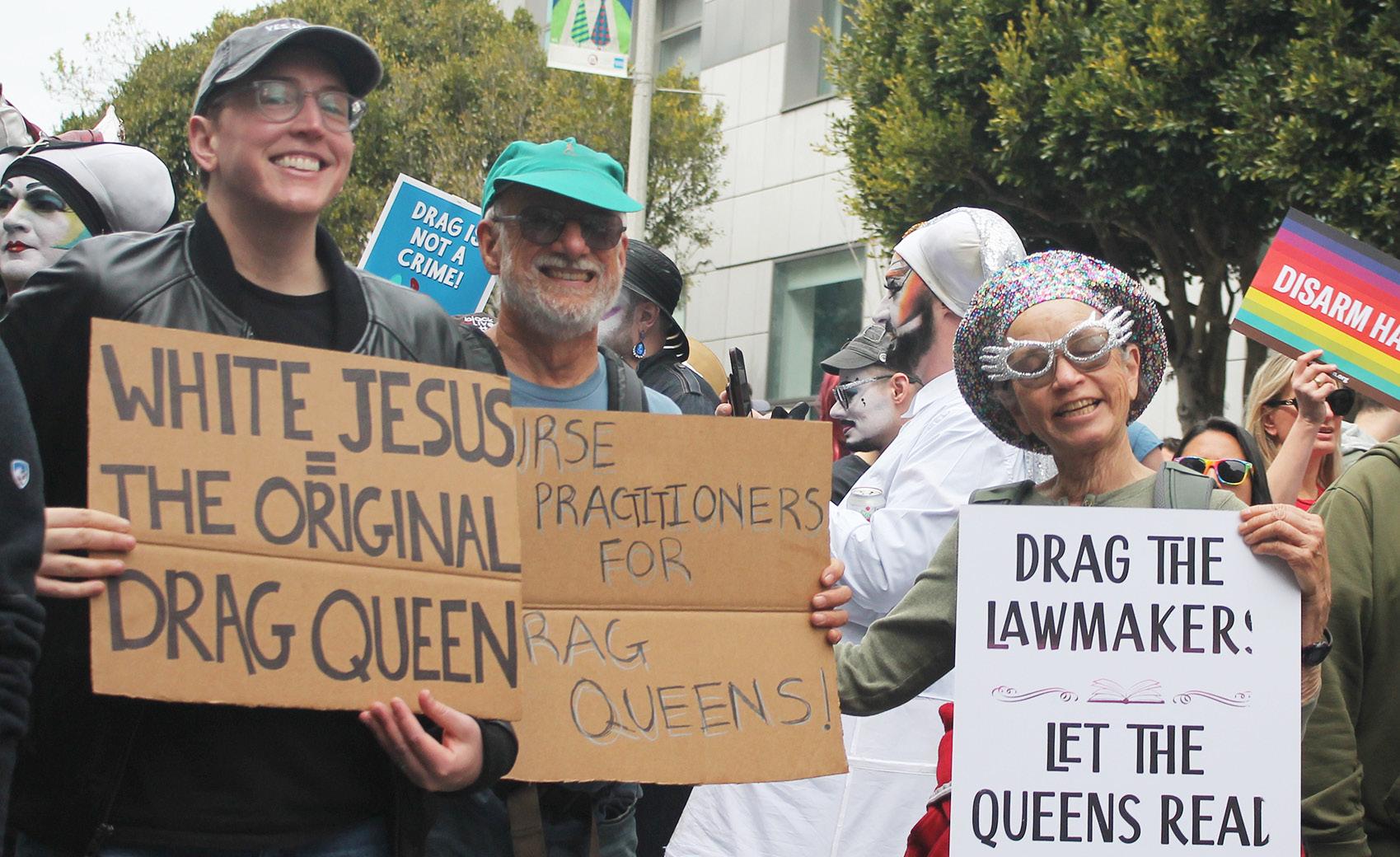
The march and rally was sponsored by 25 businesses, groups, and organizations, such as the Equality Business Alliance, Oasis, the National LGBTQ Task Force, National Center for Lesbian Rights, the city’s LGBTQ Democratic clubs – Harvey Milk and Alice B. Toklas – the Imperial Council of San Francisco, and San Francisco’s queer cultural districts in the Castro, Tenderloin, and South of Market.
The ACLU has set up the Drag Defense Fund to support legal battles against hateful legislation, like Tennessee’s SB 3. To donate, visit https:// bit.ly/3zSoP8kt
14 • Bay area reporter • April 13-19, 2023 t << From the Cover << Drag march From page 1
Kye Timmons, left, a transgender queer therapist, marched with their partner’s parents, Jim Apriletti and Asano Fertig, who came out to support Timmons and their queer daughter, Tara Fumi Apriletti, at the “Drag Up! Fight Back!” march and rally in San Francisco on Saturday, April 8.
Heather Cassell
“Drag Up! Fight Back!” organizers Juanita MORE!, left, Sister Roma, and Honey Mahogany addressed the crowd that filled San Francisco’s Union Square on Saturday, April 8.
Heather Cassell
by Cornelius Washington
Some people, regardless of sexual orientation, saw Richard Wayne Penniman, known to the world as Little Richard, as a frankly effeminate, bizarre character. However the fact that he shouted from the rooftops loudly and repeatedly that he was the architect of the American music genre rock and roll has always been in varying degrees amusing to annoying.
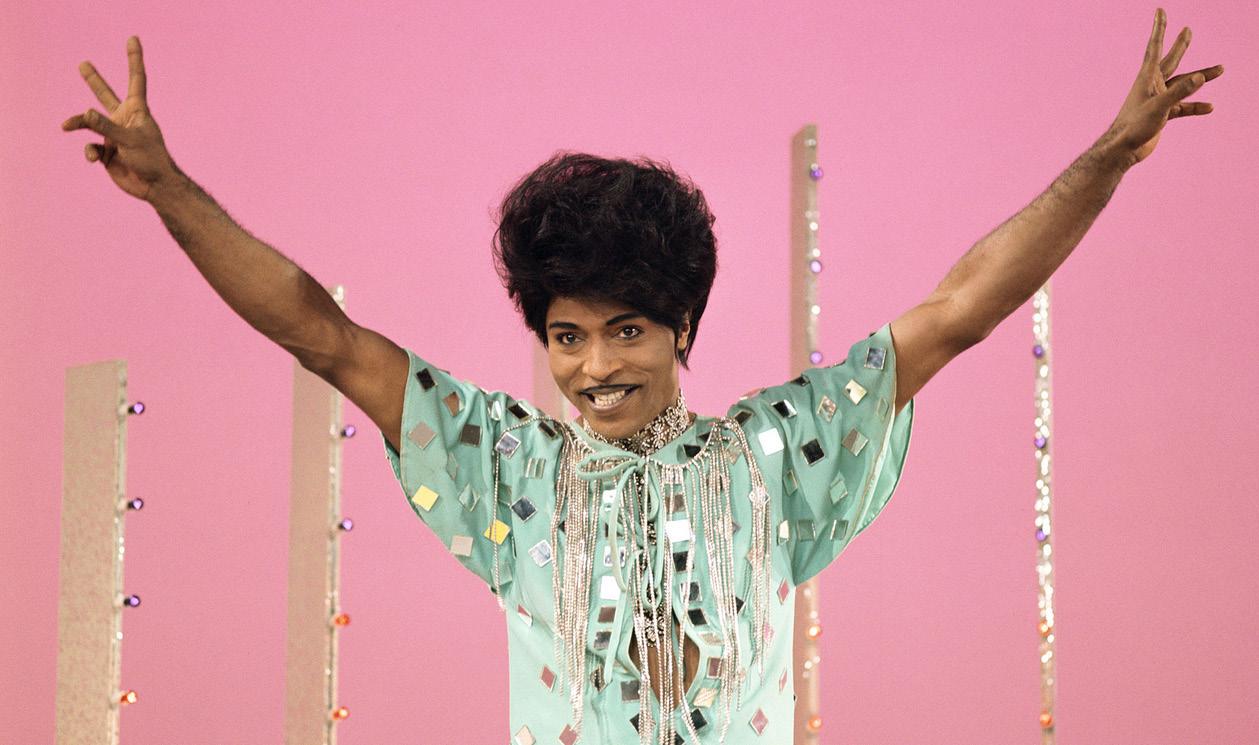
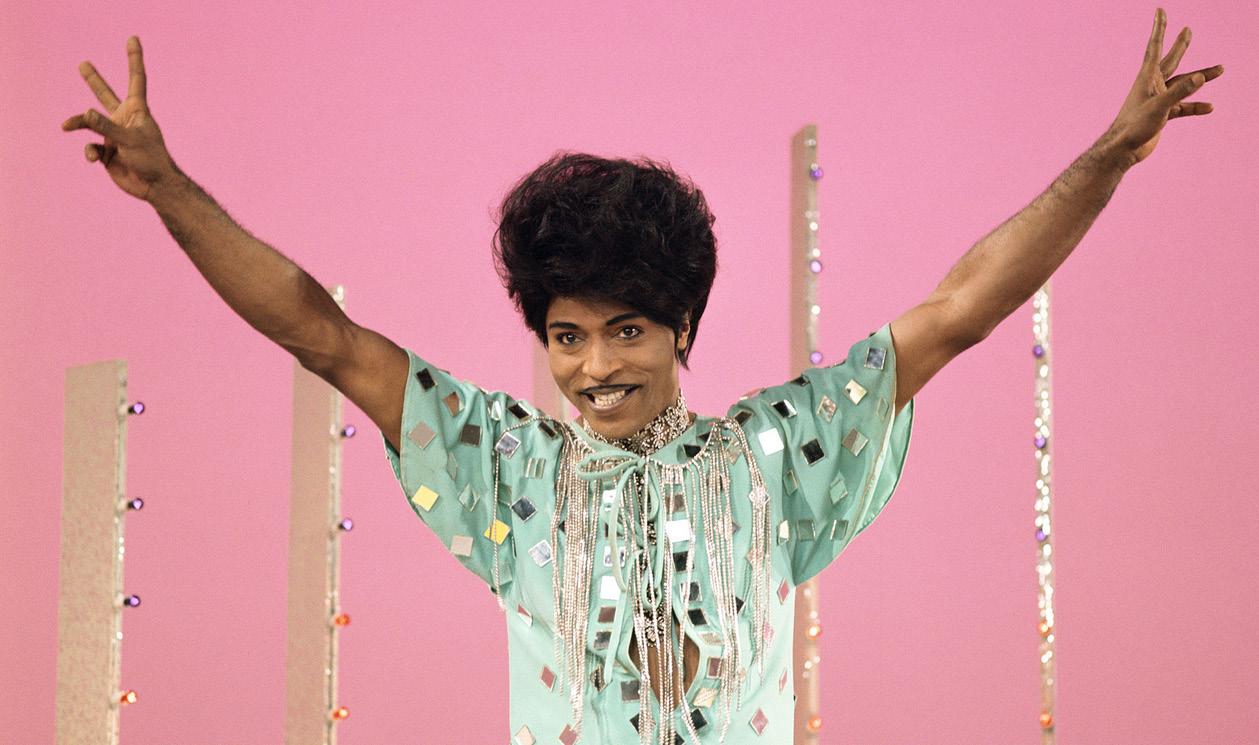
In the new documentary, “Little Richard: I Am Everything,” (Magnolia Pictures) the truth Penniman (Dec. 5, 1932–May 9, 2020) had always pro-
claimed is made staggeringly clear. He was one of the most influential people of the 20th century.
Born into a large family, Richard’s femme demeanor and love of looking beautiful in his mothers curtains, jewelry, and make up soon got him put out of his home by his abusive father, leaving him to live rough while simultaneously longing for a career in show business.
He began as a drag queen, performing in the nightclubs and honkytonks of what was known across the deep South as the Chitlin Circuit. But with his amazing agile voice and piano playing, he was soon discovered by Sister Rosetta Tharp, the innovative gospel singer and guitarist.
Richard: I Am Everything’
His skills were also honed by singer musicians Billy Wright and Esquerita; all three of these artists were queer. Richard soaked up and seasoned to taste all of these elements of the shadow life of Black culture and the documentary explains it frankly.
After being signed to Specialty Records, he soon stunned the planet with his hit, “Tutti Frutti” a watered-down version of his ode to anal sex. It was the musical equivalent to the Big Bang.
Soon, everything he recorded turned to gold, unfortunately for white artists who covered his hits while he made literally half a penny on every copy sold.
The racism is made abundantly clear throughout the documentary, not only in business but also socially. He was harassed, targeted, and beaten with billy clubs. However, the brutality did not stop him from obliterating racism and segregation with sweat, sawdust and sequins.
He not only discovered iconic mind-bending musicians, singers and performers whose names are quite familiar to the world. He also discovered and nurtured female strippers and transgender artists.
See page 18 >>
 by Heather Cassell
by Heather Cassell
Queer women have a new watering hole, Mother Bar in the Mission District, thanks to Malia Spanyol. Queer women and their friends of all ages are responding, Spanyol is thrilled. Mother was packed with queer women and their friends when the Bay Area Reporter went out on the town on a recent Friday night. Mother’s doors opened February 2, but patrons were able to enjoy the new bar early during its soft opening the weekend of January 27.
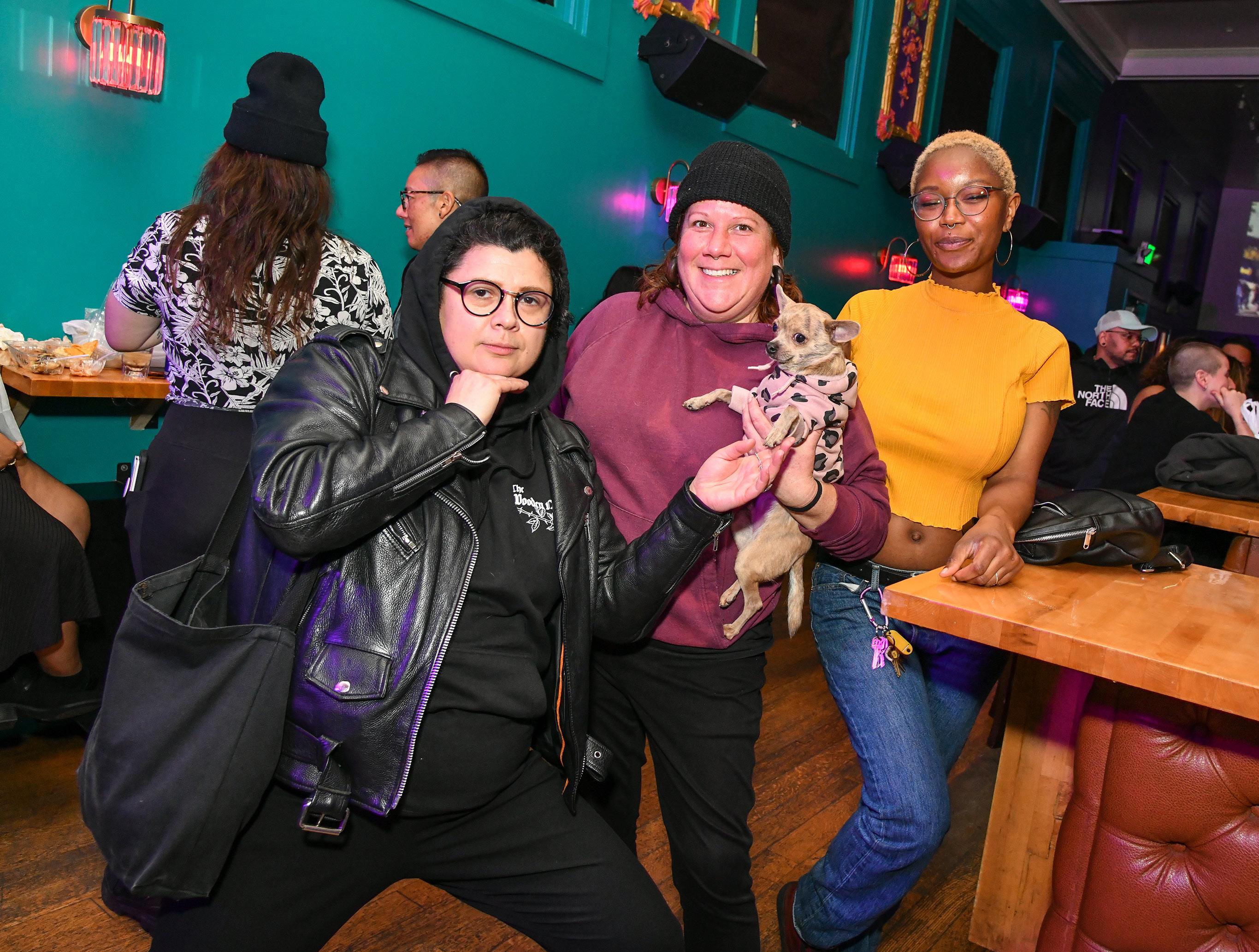
Emilie Sark, 27, was out with four of her straight friends who wanted to support her newly coming out as a bisexual woman. Her friends and she appreciated being in a woman-centric space where they felt safe and were surrounded by other queer people.
“I think it’s beautiful watching herself find spaces where she feels comfortable,” said Kate Benuska, 27, Sark’s best friend. “Being able to find someplace where she feels authentic and herself is really wonderful. I just love seeing that.”
Sark appreciated that there was a place where she could meet other women for dating and making friends.
“Coming to a place like Mother, to meet other women is so important,” said Sark. “There’s so many people that I want to flirt with or just hang out with.”
Spanyol, who is of Japanese and European heritage, is happy that her desire to open a lesbian bar, like the shuttered Lexington Club, locally called The Lex, in a central location in the Mission near 16th and Valencia, wasn’t just her selfish nostalgia for a bygone era in San Francisco.
See page 22 >>
New women’s bar at the former Esta Noche Mother’s day
ebar.com/subscribe BREAKING NEWS • EXCLUSIVE CONTENT • ONLINE EXTRAS • SPECIAL OFFERS & DISCOUNTS • GIVEAWAYS
Security staffer Anna Heredia (center), with her dog Osito, and patrons of the new Mother Bar.
Gooch
Documentary
of the rock music icon tells all ‘Little
Little Richard in a 1960s TV show
Ghosts, laughs and a witch
by David-Elijah Nahmod
“SummoningSylvia” is a new, independently produced horror comedy that’s currently available via Video on Demand. It’s a zany laugh fest that offers ghosts, a self-professed witch, and even a little social commentary about homophobia. The film was shot at an old house in New Jersey that’s purported to be actually haunted.
The film gets a nice boost from its likable cast. As the story opens Larry (Travis Coles) is planning to marry Jamie (Michael Urie). But before the wedding takes place, Larry’s friends lead him blindfolded to a Victorian mansion for a fun-filled bachelor weekend.
One of those friends, Nico (Frankie Grande) fancies himself a witch and leads the guys in a séance, during which they discover the house’s terrifying secret: one hundred years earlier Sylvia (Veanne Cox), the original owner of the house, murdered her teenage son Philip (Camden Garcia) before being murdered herself.

Our heroes soon find out that Philip was gay. They come across a photo of him and his alleged boyfriend. Is this why Sylvia killed him?
Back in the real world, the revelers are soon joined by Harrison (Nicholas Logan), Jamie’s homophobic brother. These scenes offer some biting social commentary on homophobia, yet the film never feels preachy due to the fast
Horror comedy ‘Summoning Sylvia’
and a few mild scares. But first and foremost, the film is a comedy. The cast plays their dialogue for broad laughs, and it works. Yet the comedy never detracts from the scary elements of the story. The film also features a nice drag number (even Harrison dresses up) that becomes quite topical given the anti-drag backlash currently going on in red states.
The cast is superb. Coles is particularly good in the lead role, commanding the screen in every shot he’s in. He plays off his co-stars beautifully, and, in fact, the entire cast displays a terrific chemistry with each other.
Cox, though not on screen all that much, is a frightening figure as the ghostly Sylvia. Urie, a well-known gay actor (he was in the TV series “Ugly Betty” and starred in a 2018 revival of Harvey Fierstein’s “Torch Song Trilogy” on Broadway) is somewhat wasted in a role that requires him to do little more than talk on the phone.
paced and witty dialogue. Harrison is presented as a fish out of water, which is a nice touch.
Eventually, the full story of what happened between Sylvia and her son is revealed. It’s not what the audience
might expect, and no, I’m not going to give it away.
Running a mere 75 minutes, “Summoning Sylvia” is a fun, easy to watch film. The house makes for a beautiful setting, offering a lot of creepy touches
Co-writers and co-directors Wesley Taylor and Alex Wyse have done a nice job in fashioning this horror/ comedy/social commentary mashup. “Summoning Sylvia” is definitely worth a look.t
www.summoningsylvia.com
constantly speaking truth to power and showing a resilience and work ethic that would slay a rhino throughout decades of ups and downs with his constant internal battle between his religious beliefs and his carnality.
His releasing of burdens had been previously shared in his brutally honest autobiography, “The Life and Times of Little Richard.” Its publication put him back into national consciousness as he appeared in movies, commercials, TV shows, tours and concert halls always loud proud and beautiful.
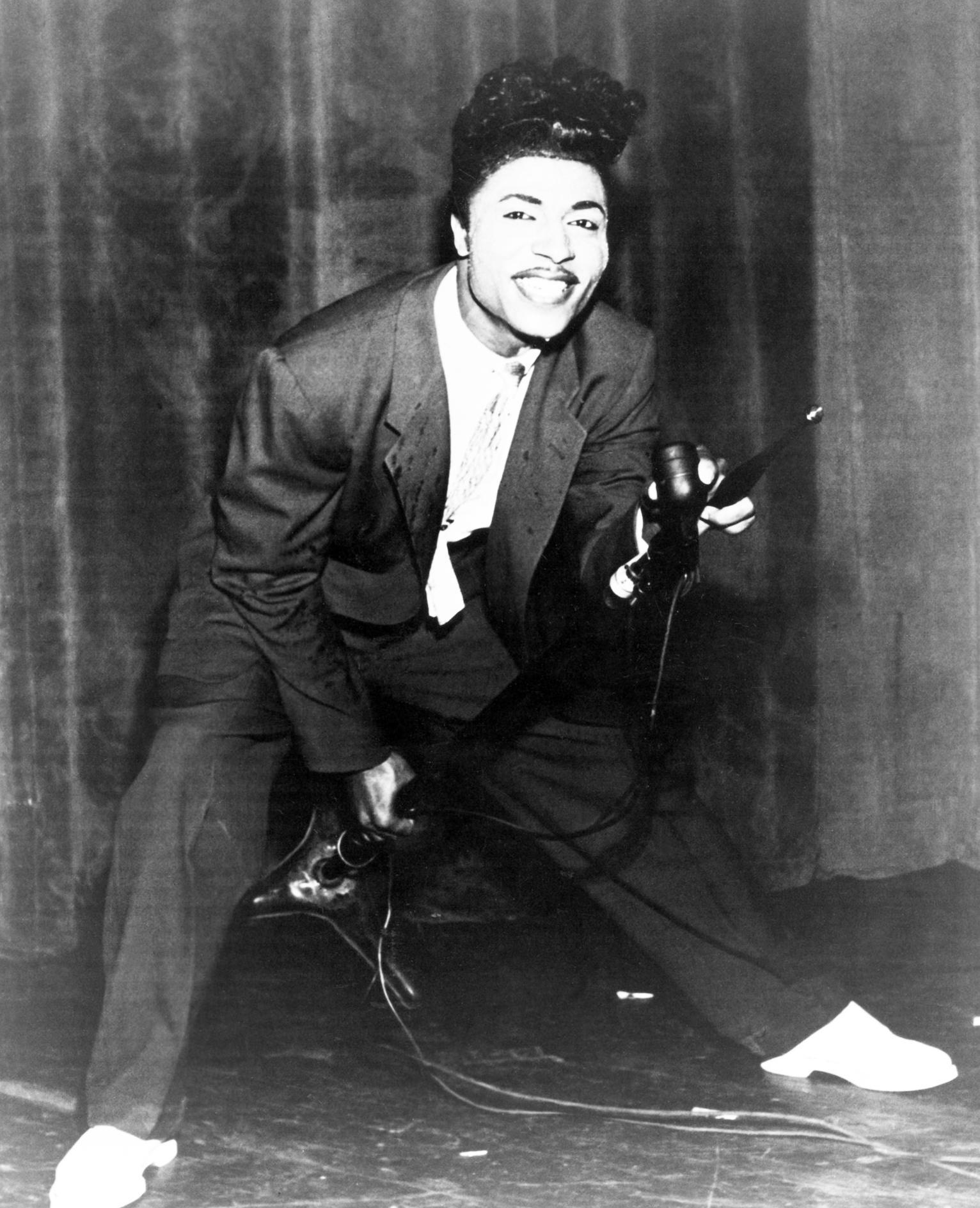
As we say in the African American community, he did “receive his flowers” while he was alive by being inducted into the Rock and Roll Hall of Fame, even though a car accident prevented him from attending.
The most moving part of the documentary is Richard getting a Lifetime Achievement award from the American Music Awards. The documentary shows Richard tearfully accepting the honor while Lionel Richie, Toni Braxton and Celine Dion, among many others, who give him a standing ovation.
From page 17
Sex, drugs, rock & roll

Teen culture was forming, and the film shows the bifurcated ambivalence between white generational ideas about Black people entertaining them with the thing that Richard was the embodiment of; the shiny, sweaty, screaming Black man with his primal African beats, honking horns, manic energy, erotically coded lyrics and lascivious eyes.
The man did his thing his way, with sex, yes, and plenty of it, and with both genders, and drugs, but more important, with rock and roll, in a celebratory interpretation that’s still lauded around the world.
The film is packed with archival stills, interviews and performances of Richard as well as wonderful original performances of his work by artists Valerie June, Corey Henry and stunningly, gospel great John P. King.
There is also an excellent array of young Black scholars and critics holding forth with their learned passionate opinions some of whom are queer; Zandria Robinson, Jason King, Tavia Nyong’o, and Fedara Hadley, as well as music stars
Billy Porter, Tom Jones, Mick Jagger, Nile Rodgers and Nona Hendrix.
The ever-amusing John Waters tells of his teen years discovering and loving Richard as well as the strikingly beautiful transgender LGBTQ activist and performer Sir Lady Java, who performed and traveled with Richard during his heyday.

Richard comes across as a timeless, extremely charismatic and strong man,

Never has a documentary been so dynamic, historic and adoring of a Black queer man. Director Lisa Cortes and her crew are to be commended and applauded for this very moving affirmation of someone who gave himself permission to be free and continues to eternally inspire others to do and be the same.
All hail to the King of Rock and Roll, the Georgia Peach, the Originator, the Emancipator, the Beauty on Duty, Little Richard.t
“Little Richard: I Am Everything” screens at The Roxie starting April 11, 3117 16th St. littlericharddocumentary.com roxie.com

18 • Bay area reporter • April 13-19, 2023
t << Film AUTO EROTICA PURVEYOR OF VINTAGE PORN MAGAZINES BOOKS PHOTOGRAPHS 4077A 18th St. OPEN EVERY DAY 415•861•5787{ { AUTO EROTICA PURVEYOR OF VINTAGE PORN MAGAZINES • BOOKS • PHOTOGRAPHS 4077A 18th St. OPEN EVERY DAY 415•861•5787{ { AUTO EROTICA PURVEYOR OF VINTAGE PORN MAGAZINES • BOOKS • PHOTOGRAPHS 4077A 18th St. OPEN EVERY DAY 415•861•5787{ { WE BUY & SELL GAY STUFF! MONDAY-SATURDAY Personals Massage>> MEN TO MEN MASSAGE I'm a Tall Latin Man. If you're looking, I'm the right guy for you. My rates are $90/hr & $130/90 min. My work hours: 10am-10pm everyday. 415- 5150594 Patrick, call or text. See pics on ebar.com
<< Little Richard
Noah J. Ricketts (Kevin), Frankie Grande (Nico), and Troy Iwata (Reggie) in ‘Summoning Sylvia’
Little Richard in the 1950s
Little Richard in a 1970s interview

























































JOB #: GRT-20748 APR_BAY AREA ALL IN PRINT US 101 TO EXIT 484. 288 GOLF COURSE DRIVE WEST, ROHNERT PARK, CA P 707.588.7100 PLAY WITHIN YOUR LIMITS. IF YOU THINK YOU HAVE A GAMBLING PROBLEM, CALL 1-800-GAMBLER FOR HELP. ROHNERT PARK, CA. © 2023 GRATON RESORT & CASINO IT’S All In ONE PLACE LUXURIOUS ROOMS WORLD-CLASS SPA & SALON RESORT-STYLE POOL AWARD-WINNING DINING LIVE ENTERTAINMENT One amazing destination, so many reasons to experience it.
In the spotlight
by Jim Gladstone
Abreakout glam rock cabaret star; a character actress who plays a whole cast of characters; Broadway’s standby success story of the year; and a show tune interpreter like you’ve never heard before. Mid-April brings a quartet of singular talents to San Francisco stages for showcase performances. I rang them up and asked them to tell us about their performances.
Nocturnal animal:
Ryan Patrick Welsh

“Shows in San Francisco usually start so early,” said leggy, long-tressed Ryan Patrick Welsh, nonchalantly. “I’m fine owning Sundays at 10pm.”
The confidence with which Welsh booked two unusual late-night spots for his “Sex, Camp, Rock ‘n’ Roll” performances at Oasis this month are well earned. When he debuted the ampedup autobiographical extravaganza last year after developing it through Oasis’ arts residency program, it sold out every show.
The 33-year-old belter, who has a degree in musical theatre from the Catholic University of America in Washington, D.C., says that he discovered his path away from traditional Broadway-style performance while singing in D.C. piano bar Shaw’s Tavern and at Martuni’s after moving to San Francisco eight years ago.
“I learned how to command the attention of a room and got good at off-the-cuff mic work. It’s performing, but I get to play myself instead of a character.”
That said, Welsh – who performs with a full rock band and backup singerdancers – is himself quite the character. Some of the funniest anecdotes in his sometimes surprisingly tender show are about supporting himself through sex work for the past six years.
“My mother was not going to miss this big show I’d been working on for so long,” he recalled of last summer’s premiere. “So I had to call my parents a month before and come out all over again as a sex worker.”
Welsh’s parents are both showbiz aficionados (For their first date they saw Patti LuPone in “Anything Goes”) whose Bette Midler albums and videos he cites as an early influence. But it was only after the debut of “Sex, Camp, Rock ‘n’ Roll” that he first
Singular talents hit local stages
watched a recording of what is now a creative touchstone.
“I had somehow never seen Sandra Bernhard’s ‘Without You I’m Nothing’,” he said. “And when I finally did, I was like this is it!”
“Sex, Camp, Rock ‘n’ Roll,” April 16 & 23. $25-$35. Oasis, 298 11th St. (415) 795-3180. www.sfoasis.com
Inner child’s play: Tina D’Elia
“When I was a kid, I had these little stuffed toy mice and every one of them had to have a different voice and personality,” said lesbian writer-actress
Tina D’Elia, discussing the uninhibited glee she brings to her solo show, “The Rita Hayworth of this Generation,” now at Theatre Rhinoceros.
“My uncle was a puppeteer, so that might have something to do with it too,” she added.
With the zeal of a child given imaginative free reign, D’Elia is becomes puppets and puppeteer, wildly shifting between almost a dozen characters and literally bouncing off the walls in this playpen of a production which she describes as “a queer noir slapstick comedy.”
The cockamamie plot takes Hayworth-worshipping ingénue Carmelita from her home in Bakersfield to a revisionist Vegas where she flits between Rat Packy showrooms, a magical portal to the afterlife, and sessions of hot sex with the celebrated “transgender king of blackjack.”
D’Elia coos, squawks, growls and
even sings a few ditties as she spins around the Rhino stage in 75 minutes of comic abandon. It’s a bravely crazy little spectacle.
“The Rita Hayworth of this Generation,” through April 23. $12.50-$25. Theatre Rhinoceros, 4229 18th St. (415) 552-4100. www.therhino.org
In from the wings:
Julie Benko
“I’m probably the only music theater girl who didn’t grow up with ‘Funny Girl,’” confessed Julie Benko, 34, whose early Broadway memories more prominently feature the likes of “Rent” and “Spring Awakening.”
In fact, Benko – who performs with her husband, Jason Yeager, in the Bay Area Cabaret Series at the Venetian Room on Sunday – had never seen the stage musical or even the Barbra Streisand film version when, in 2021, she was asked to audition for the producers of the recent Broadway revival of the Fanny Brice bio-musical.

“I did watch the movie before I went in for callbacks,” says Benko, who went on to be cast as the standby for Beanie Feldstein in the role of Fanny.
Then, between Feldstein’s muchgossiped-about early exit and Lea Michele’s taking over the role, Benko had the fairytale opportunity to step into the spotlight as the top-billed leading lady for a month-long run.
Having already impressed theater insiders while covering for Feldstein a whopping 26 times in just over three
months, Benko became the toast of the town. She continues to play the topbilled role on Thursday nights throughout Michele’s run and has begun to see the benefits of a much higher profile, including her booking in the Venetian Room.
Benko has previously played the Bay Area twice, in the first national tour of “Spring Awakening” and in TheatreWorks Silicon Valley’s 2017 production of the Steven Schwartz/ Charles Strouse musical “Rags.”
On Sunday, Benko will be accompanied by a four-piece jazz combo led by her musician husband.
“Over the pandemic, we had the chance to work with each other as a duo and ended up recording an album. This show is the West Coast concert debut of the music we recorded.”
Like that album, “Hand in Hand,” their concert will include a rendition of the signature “Funny Girl” song, “People.”
“It’s not like the Barbra Streisand version,” Benko proudly notes. “We’ve done it our own way, as a tango.”
Julie Benko and Jason Yeager, April 16. $30-$70. The Venetian Room at the Fairmont San Francisco, 950 Mason St. (415) 927-4636. www.bayareacabaret.org www.juliebenko.com
Life is a cabaret: Eleri Ward
“I enjoy theater music in the context of a show, but I kind of don’t want to listen to it on a cast album ever again,” said Eleri Ward, who brings her ethe-
What have we learned? ‘English’ at Berkeley Rep
adventure for her.
Mehry Eslaminia is also superb as Elham, an accomplished pre-med student who has repeatedly failed to pass the TOEFL exam that will earn her the right to matriculate at an Australian university.
More sophisticated than her younger classmate, she wrestles a stubborn inner resistance to mastering English, as if absorbing the language might somehow dilute her proud Persian soul.
In the smaller role of Roya, Sarah Nina Hayon is convincingly interested in English only as a way to stay connected with her granddaughter in Canada. It’s a necessary nuisance. When her expat son rejects her loving efforts, her heart breaks, and her broken English is discarded as useless.
These three utterly unactorly performances have a clarity and coherence that contrast with the muddy subtexts of Toossi’s script that leave the play’s other two characters as ciphers.
by Jim Gladstone
Overall, I’d give Sanaz Toossi’s “English,” set in an Iranian ESL class and now playing at the Berkeley Rep, a solid B. But three of its cast members deliver A-plus performances that elevate the entire production to

honor roll status.
In the role of Goli, a cheerful, curious high school student, Christine Mirzayan lights up the stage. Bashful, mischievous and ultimately proud of her accomplishments, Goli has a completely believable guilelessness. Learning a new language is a playful

Omid, the sole male student (Amir Malaklou) and Marjan, the teacher (Sahar Bibiyan) are difficult to connect with; I say this as an audience member but suspect the actors may have a similar challenge.
Both Marjan and Omid have spent time living in more socially liberal English-speaking countries: She lived in the U.K. for nearly a decade. Toward
the play’s end, we learn that he was raised in the U.S. but returned with his Iranian parents as a young teen. She never explains why she came back. He never says anything to compare the two cultures he’s lived in. In a play that’s ostensibly about language, this lack of articulation is frustrating.
Director Mina Morita takes advantage of every opportunity to bring gentle humor to the proceedings and
real, guitar-accompanied take on the Stephen Sondheim songbook to Feinstein’s at the Nikko on April 20.
Ward, 29, who has previously cited the eccentric pop musician Sufjan Stevens as an influence, says that her favorite musical artist “of all time” is Caroline Polachek, formerly the lead singer for Chairlift, whose two solo albums combine intense, dreamlike sweep with startling intimacy.

“I feel like she reintroduced me to myself,” explained Ward, a conservatory-trained singer who has performed in musicals in New York as well as regionally. “I feel like years of being conditioned by performing in musical theater hid me from myself in a way.”
“I want to write a musical, but I want to bring the sensibility of lyricism and poeticism and grand stretching melodies that I feel in her work to it.”
“I want music to transcend the mundane, not to sound like it could be a conversation or a diary entry.”
Of all the musical theater composers she’s encountered, says Ward, Sondheim is the one who writes songs that consistently speak to her.”

“As a child who was interested in theater, I was exposed to lots of jazz hands and big smiles. But when I first listened to Sondheim as an adolescent, I felt this shared affinity for the shadow of the story, the underbelly of things.”
Eleri Ward, April 20. $65. Feinstein’s at the Nikko, 222 Mason St. (886) 663-1063. www.feinsteinssf.com www.eleriward.comt
keeps things moving at a brisk pace throughout the evening. But there’s only so much that can be made of Toosi’s frustratingly elusive text. “English” needs more of a lesson plan.t
“English,” through May 7. $24-$123. Berkeley Repertory Theatre, 2015 Addison St. (510) 647-2949 www.berkeleyrep.org
20 • Bay area reporter • April 13-19, 2023
t << Theater
Left to Right: Performers Ryan Patrick Welsh, Tina D’Elia, Julie Benko and Eleri Ward
Vince Thomas Rebecca J Michelson
Mehry Eslaminia (Elham) and Christine Mirzayan (Goli) in the West Coast premiere of Sanaz Toossi’s English.
“Serious people my age are dead.” —Al Jaffee (1921-2023), in an interview from 2010
Alessandra Mello/Berkeley Repertory Theatre















LGBTQsurvey.com Grab a coffee, take the survey, Grab a coffee, take the survey, make a difference. Take the 17th Annual LGBTQ Community Survey® LGBTQ research helps non-profits, universities and businesses better understand and serve our community. Download survey results free of charge at cmi.info Proudly LGBTQ-Owned and -Operated. A pioneer in LGBTQ research since 1992. Your information is confidential, used for research purposes only. You will not be contacted for marketing purposes. M Y MY CY K CMI_Full_Page_English_Bleed.pdf 1 3/13/23 7:08 PM Take the survey now on your mobile device: Scan QR code to begin.
A timeless punk diva Romeo Void’s
Debora Iyall
t <<
little club. He recorded tons of bands. At some point, it might have been in the ’90s, Terry approached and said, “I’ve got these great recordings of Romeo Void, would you like to hear them? I’ll dub you some copies.”
So, I had heard them a long time ago. It was interesting because (sax player) Benjamin (Bossi) had joined the band like a matter of weeks before that was recorded. When I hear those recordings I can hear him starting to gel with the band and also starting to learn how to improvise with his jazz training with our sound. It’s this formative picture of Romeo Void finding our sound a little bit.
by Gregg Shapiro
Recorded in 1980, Romeo Void’s “Live From Mabuhay Gardens, November 14, 1980” (Liberation Hall) is finally seeing the light of day in 2023 as a Record Store Day (April 22) release. The previously unreleased 11-track live set, on opaque blue galaxy vinyl, features songs such as “Nothing For Me,” “Confrontation,” “White Sweater,” and “Talk Dirty To Me,” that would later make their way to the San Francisco-based band’s exceptional 415 Records debut “It’s A Condition.”
Unquestionably, it was lead singer Debora Iyall’s distinctive vocals, which alternated between impassioned and indifferent (remember later singles “Never Say Never” and “A Girl in Trouble”?), that set Romeo Void apart from other bands of the era.

Gregg Shapiro: Debora, can you confirm the story behind the band’s name Romeo Void. Is it true that it’s related to the shortage of eligible straight men in San Francisco in the late 1970s and early 1980s?

Debora Iyall: Yes. Actually, it was kind of inspired by the cover of a local magazine I think it was just called “San Francisco Magazine,” and the headline was “Why Straight Women Can’t Get Laid in San Francisco.” A couple of band members and I were sitting around our kitchen table, and I had made lists of words to try to put together so we can come up with the name of the band.
We didn’t want anything that had a “the” in it. I wanted something kind of poetic. I read a lot of Anais Nin and poets and things like that. I had gotten a bunch of words from her books that I had around. One of the words was “Romeo” and one was “void.” When we put it together, with that magazine, it was like, “Okay, that’s the name of our band!” I did write plenty of lyrics that were about failed or aborted or whatever romance issues. “Love is an illness.” Thematically, we were in a good place.
The song “Never Say Never” not only became a hit, but also Romeo Void’s trademark tune in a way. Did you have an inkling that the song would become something of an anthem?
Not in the slightest. Not even in our wildest dreams, especially when we were writing. Do you realize that we had recorded for a few days with Ric, and we haven’t even played it for
him? His engineer came to our gig at Spit, I think, the night before we were leaving. You always had to have everything bumped up against some gigs so you could afford to have the band out. We had all our gear packed up out of the studio. We were leaving the next morning. As an encore at the gig, we played “Never Say Never.”
Ian Taylor, the engineer on the record, who’d worked with AC/DC and was a really good engineer, saw us do it. He said, “Why didn’t you guys ever play that song for us?”
We said, “We’re not done with it. It doesn’t have a form yet. It’s kind of a jam.”
He said, “Oh, my God, I’ve got to call Ric and we’ve got to load you back into the studio because we’ve got to record that!”
We said, “Okay, but it’s still not really finished.”
I was one of those writers who had a couple of pages with lyrics and I’d slowly find phrases that work together. Beat-poetry-style stream-ofconsciousness. I had a lot of lyrics for “Never Say Never” and not really a chorus formed when we actually went into the studio. I kind of did, but then it was like, “No, that’s the chorus: ‘I might like you better if we slept together.’ You’re gonna repeat that a couple of different times throughout the song.”
We were forming it by committee while we were hooked up to the studio [laughs]. The take that we have, that you hear on the final, was originally 13 minutes. It was cut down and edited to be, I think, almost seven minutes now. The song was formed through the miracle
of editing. Once we got it cut down, then I had to double my vocals, and we did more overdubs. There was an overdub drum line where the drummer played on his drum hardware to make a percussion sound. That always sounded really good in the clubs.
The new, forthcoming Record Store Day LP “Live From Mabuhay Gardens, November 14, 1980” is a live recording that pre-dates the release of “It’s A Condition.” Did you know the recording existed, was it in your possession, or did someone else have it for safekeeping?
Terry Hammer was the sound person at the Mabuhay Gardens, which is where almost all the bands in San Francisco were playing that were playing around that time. The Avengers, The Nuns, you name it. Lene Lovich and Patti Smith came through and played Mabuhay. Everybody played this one
It was well before we’d been on tour. Like you said, before we recorded “It’s A Condition.” What strikes me when I hear it is how lucky was I to have these musicians indulge me as a singer and writer, let me create with them and make these new things happen from nothing, from a jam. Because I had no musical training.
Being a band with San Francisco roots, were you and the other members of Romeo Void aware of an LGBTQ following for the band, and if so, what did that fan base mean to you?

Oh, always! And they were some of our best friends. Our sound man Louie, who did the first recordings of us in the studio was learning how to become a sound engineer and we were his first project. He was my roommate. Different people that we would connect with when we went to New York were gay, and that we knew back in San Francisco. When we went to New York, they came to our shows. You just embrace and love who you’re around. There were a lot of gay people in the audience of punk rock band. Seeing Iggy Pop? Are you kidding me? There are not gay people at that? It was no big deal because it was San Francisco. People sought their people by coming to our town. We benefited from having that beautiful diversity and cultural awareness and outlaw outlook, not needing to conform in any way.t
www.romeovoid.com
Read the full interview, with music videos, on www.ebar.com.
<< Mother
From page 17
“I didn’t know if anyone even needed this. I needed this, but I thought maybe I’m just a grumpy old dyke,” said Spanyol, who gets excited seeing the bar fill up with women.
Vanessa Weng, 40, who self-described her sexuality as “tricky,” and her friend Jenny Huang, 45, a queer woman, appreciated that the Bay Area’s lesbian bars are now owned by queer women of color.

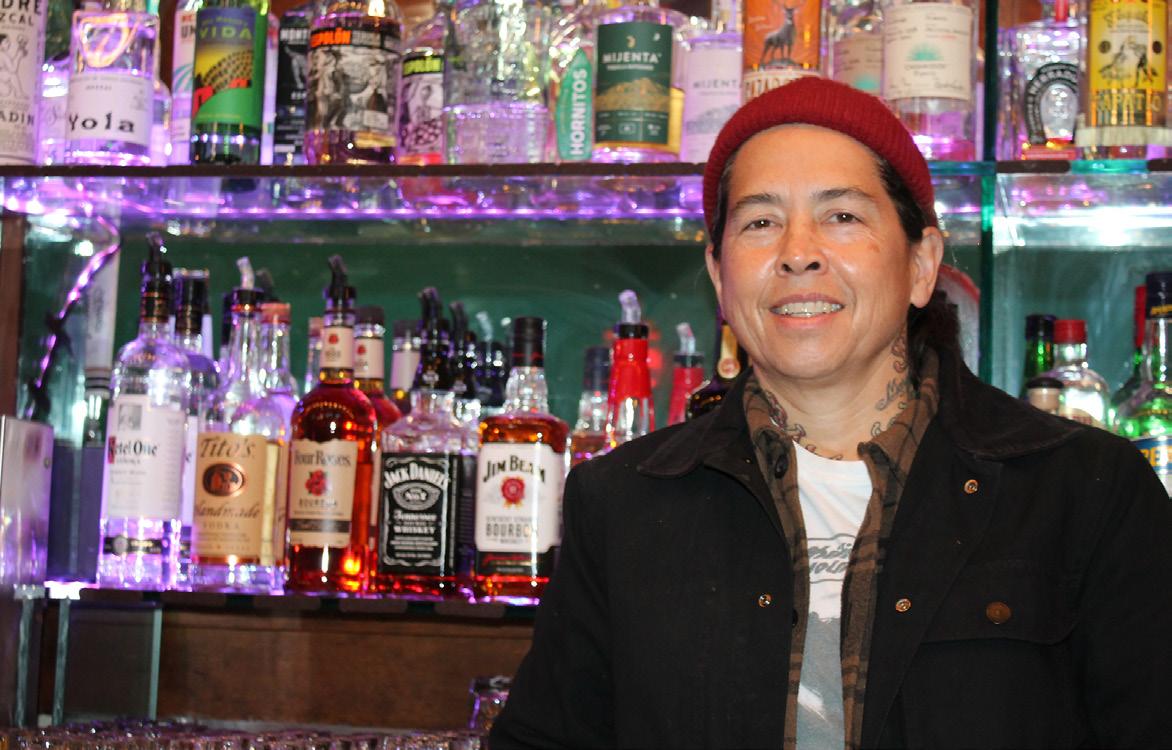
“It’s really wonderful,” said Weng. Huang wasn’t as satisfied, noting the under-representation of women, especially women of color, in both the straight and LGBTQ communities. She pointed out that until now queer

women had one night a month at a circuit party compared to gay men who have many places to mingle.
“We need a lot more,” not only spaces but representation of women, she said. “We just want to feel more women empowerment. I’ve had a lot of people come up and just say, ‘Thank you. That feels good.”
Inspired by the past Spanyol, a 53-year-old tattooed businesswoman, came of age in San Francisco’s ‘Gay ’90s’ when queer women ruled Valencia Street and the Mission District with Red Dora’s Bearded Lady, Old Wives Tales Bookstore, Osento Women’s Bathhouse and Good Vibrations. Lesbian bars included Amelia’s, Maud’s, Artemis
Society, Latina bar Sofia’s, and the Lexington Club, which Spanyol called her “second home” until it closed in 2014.
“I grew up in the city in the ’90s, which was dyke heyday,” Spanyol recalled. She found her community at bars and clubs like the late Heklina’s TrannyShack, the Mission punk/hard rock bar Chatterbox, and the Castro’s The Café. “The city, it was punk. It was dirty. It was queer. It was wild. It felt so great to grow up in that environment. I didn’t know people like me existed. I found community when I came to San Francisco.”
However, in the nearly 35 years since Spanyol first arrived in the City by the Bay, the city has undergone a transformation from a livable city for artists to the tech hub of the world. The vibe
changed, especially in the Mission, which techies claimed as their own. One by one, the women-centered spaces along Valencia Street and around the Mission shuttered with the rise of the digital era and gentrification.

“This town used to be fun. This town used to be interesting,” said Spanyol, a longtime resident of the Mission District. Now, she only feels uncomfortable in her own neighborhood. “When I walk down certain streets in the Mission, I get funny looks, I’m getting judged, and I get rude comments. I’m not comfortable in a lot of the spaces in the Mission. I am not comfortable in this town.”
Spanyol was already uncomfortable before COVID-19, but her discomfort grew when the pandemic hit. She
was bored, concerned about the many queer- and women-owned businesses shuttering during the pandemic. She felt the loss of knowing where to find her community, and nostalgia for the loss of the Mission’s queer womencentric spaces. She started looking for and mapping the queer women’s bars and spaces in the Mission and around San Francisco.
Then last summer, Chloe Sherman’s photo exhibit, “Renegades,” which explored San Francisco’s queer women’s scene in the 1990s, opened. Many of the photos were taken at the Lex, which closed after 18 years in 2014. Suddenly, Spanyol’s rebellious spirit rose up, “I’m just like, ‘Fuck you guys!’”
See page 23 >>
22 • Bay area reporter • April 13-19, 2023
Music
Left: Debora Iyall in a concert aired on VH1 Right: Romeo Void in the 1980s
Debora Iyall in 2022 Instagram
Romeo Void’s ‘Live From Mabuhay Gardens, November 14, 1980’
Left to Right: The new Mother Bar with a fresh lavender paint job; Malia Spanyol, owner of Mother Bar; Friends Jamie Okada, Kate Benuska, and Emilie Sark out at Mother Bar
Gooch Heather Cassell Heather Cassell
What’s Enough? Pianist Stephen Hough’s new memoir
by Tim Pfaff
A music critic writing for, let’s say, this newspaper could not cover every new CD release by pianist Stephen Hough. They are so numerous it would require a weekly column for Hough alone. I know; I tried it. Designated one of the 20 living polymaths by “The Economist,” Hough has, in recent years, added to his discography and busy concert schedule a welter of new musical compositions – not all of them for piano – a book of picked-up pieces including some criticism, a daring novel, a memoir, and some paintings.
Oh, and last year he was knighted by then-Queen Elizabeth. Presto: Sir Stephen Hough. All he lacks is the time for is putting a step wrong. If there is a reason to return to him now, it’s because in recent months there have been publications of his work in three bailiwicks: his string quartet, alongside Ravel’s and Duttileux’s, by the superb Takacs Quartet (Hyperion) (with whom Gough had previously recorded the Brahms Piano Quintet); a memoir, “Enough” (Faber and Faber); and “Musica callada,” the late solo-piano suite of Federico Mompou.

The meditative Mompou
Even devoted musicophiles could be forgiven for being unfamiliar with Mompou (1893-1987), a Spanish composer of French extraction. Hough has paved a path for the appreciation of Mompou by recording several of his colorful, beguiling miniatures on his recital CDs and in encores.
The hour-long, four-section, 28-movement “Musica callada” (“Silent Music”), composed over the years 1959 to 1967, is meditative music whose source is the writings of the 16th-century Carmelite, St. John of the Cross. What makes the music “silent” – vaporizing,” in Hough’s word – is its having been pared down to its essentials. With just a few exceptions, the movements are slow in tempo, simple in expression, and anything but piano showpieces.
New to me, they reminded me of Vladimir Horowitz’s assertion that he was unperturbed by the most thorny piano concertos but put in a cold sweat by “Träumerei,” an achingly simple, completely exposed movement
Stephen Hough
of Robet Schumann’s “Kinderszenen” that poses few technical challenges.



Hough has long ago demonstrated his fearlessness in tackling difficult music. His performance of the “Silent music” is devotional in all ways.
Hough’s legendarily fine touch has rarely been deployed on music as austere and almost colorless as this suite. It may never have been tested to this extent before. The economy of means by both composer and pianist is remarkable, and Hough is supremely focused and steady.
The result is that both performer and listener are drawn into a quiet, only inwardly dynamic, ecstasy. It could be argued that this music is in-

appropriate for the recital stage, but Hough’s own spirituality makes it perfect for recording and the concentrated home listening they afford. There is more than one way to be carried away.
Hough composing himself
Hough’s String Quartet, entitled “Les Six Rencontres,” is named, teasingly, String Quartet No. 1, hinting at if not promising a sequel. In stark contrast to the essential quiet of the “Silent Music,” the quartet is active, overtly challenging technically, complex and, yet, in its own way, plain-speaking. Its recent performance by the Takacs Quartet (with whom Hough had previously recorded the Brahms Piano Quintet) lends a welcome sense of ease to the music’s sophistication. What establishes it as important music is the extent to which both the composer and his exponents care to make it communicate to an audience beyond the academy and music professionals.
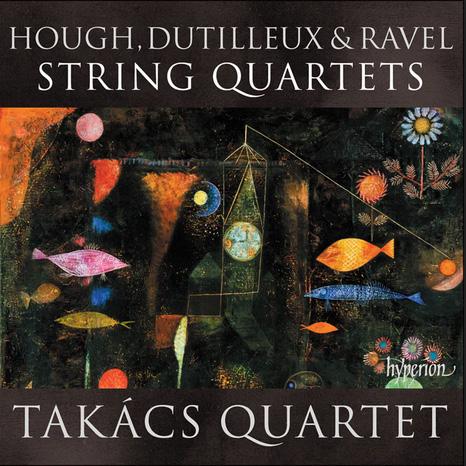
With no curtailing of his concertizing, which was tellingly less interrupted by COVID than many others, Hough is increasingly focused on composition, producing a significant body of music that has won accolades from audiences and critics alike. The vocal music folds in gay subject matter as strongly yet unsensationally that Hough is now regularly being compared, favorably, to gay musical giant Benjamin Britten.
There are some 50 compositions, some of them full-length, on Hough’s website, almost all of them for scheduled public performance. Piano music is of course central by but no means the only genre. In January, four well-known singers selected by Hough performed his song cycle, “Songs of Love and Loss,” at London’s prestigious Wigmore Hall, and Hough will inaugurate the Wigmore’s forthcoming fall season. Hough’s music can be sampled on YouTube.
Hough’s “Enough”
The piano is not the only keyboard at which Hough is adroit. His com-
puter keyboards have produced reams of exemplary writing. Even the writing about music is directed at the lay reader.
His novel, “The Final Retreat,” looks deeply into the dilemma of a young priest attracted to and involved with young men, not too young but not infrequently “bed sits” (rent boys) and the Catholic Church, which has dispatched him to a retreat for errant priests to cleanse him. The novel has become a kind of handbook for some retreats of that type, as it doesn’t demonize either side.
Structurally, “Enough” hews to the formula established in “Rough Ideas,” a collection of his journalistic writings whose small sections function not unlike Nietzsche’s aphorisms. True to its subtitle, “Scenes of Childhood” (that Schumann work again), it moves chronologically from a childhood recalled and evoked as vividly and mysteriously as one of Henry James’s children– right up to Hough’s Carnegie Hall recital, where another pianist’s memoir might begin.
The book is a leap forward in Hough’s already advanced writing,

substantively and as (another) practice. It’s hardly the only memoir by a famous gay musician, but in many ways it’s the deepest. It looks at all the facets of Hough’s life, including his sexuality, with a penetrating gaze that doesn’t shy away from the specific but approaches everything with real care.
Hough was not the first classical pianist to come out, but his coming out has been the most open and articulate, forceful in its way. Being gay informs everything in his life, if not always expressly. His musing about his childhood glimpse of his father’s penis approaches the transcendental.
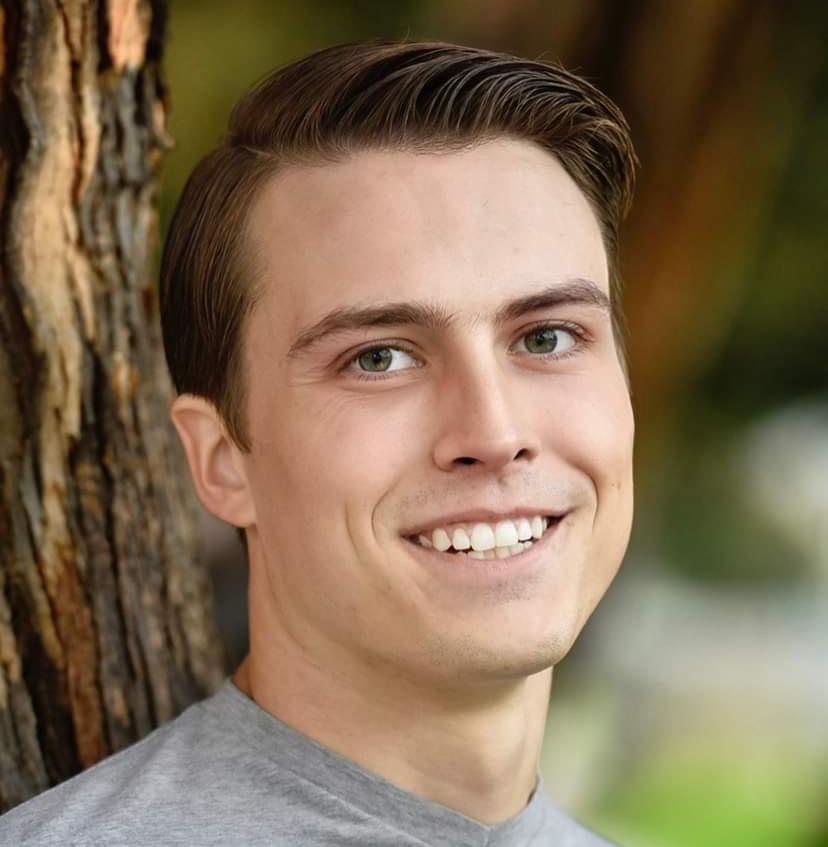

This book is as personal as Hough’s personal and stage postures are personable, preempting narcissism with warmth, modesty, and a big helping of wit.t
Stephen Hough’s ‘Enough: Scenes from Childhood,’ Faber, 233 pages, $26.95 Stephen Hough’s ‘Federico Mompou, Musica callada,’ Hyperion, $19.95 Stephen Hough’s ‘String Quartet, with quartets by Ravel and Dutilleux, Takacs Quartet, Hyperion,’ $19.95 www.StephenHough.com


Professional
StevenUnderhill
Wild Side West in Bernal Heights. Spanyol started looking for the right space to open a new bar. When the former Esta Noche space became available at the end of 2022, Mother quickly started to become a reality.
Mother lovin’
The bar’s name, Mother, derives from Spanyol’s former dive bar, Pops, the fact that she is a mother, and her staff call her mother. “It’s a very protective word,” Spanyol said. “It feels very protective and endearing, but also like, you don’t fuck with a mother bear.”
<< Mother From page 22
to the people who look at her strangely in restaurants and on the streets.
“Where are the weirdos, the artists, and all the interesting people?” she asked. “I need a space where I can go to where I can hang out with my girlfriend, not be judged, not get dirty looks, and not feel weird,” she said.
San Francisco didn’t have a lesbian bar for four years until U-Haul owner Jolene Linsangan opened Jolene’s Bar and Restaurant in 2018. Queer women had beloved circuit parties, such as Cockblock, which closed in 2016, the long-running Mango at lesbianowned El Rio, and lesbian-owned
Mother is Spanyol’s sixth business. She has been immersed in San Francisco’s restaurant, bar, and nightlife scene since she moved to the city in 1989 from Oahu, after a brief stopover in Arizona. She started out working in restaurants and bartending and being a barback in bars while working her way through earning a marine biology degree at San Francisco State University.
Fourteen years later, Spanyol, who developed her interest in business, bought the Mission dive bar Pops with Harmony Urmston in 2003. She sold Pops in 2014. She then followed up with live music venue and bar, Thee Parkside in 2007.

When the tech companies moved into Potrero Hill, she opened La Lucha coffee window on the side of Thee Parkside in 2015. She also started training in Muay Thai boxing in 2007.
In 2018, she opened Woodenman Muay Thai gym with her trainer in SoMa. The pandemic didn’t stop her, a
friend tipped her off to an opportunity and she opened La Lucha Coffee Shop in Noe Valley in 2021.
Spanyol wants Mother to evolve into what it will be. Right now, she envisions the bar to be a place where queer women can hang out after work with friends or bring a girl on a first or millionth date.
“The reason why I loved the Lex is that there was never a cover,” Spanyol said. “I don’t want it to be a place where you have to worry about a cover … or a big event going on.”
She also plans to have Karaoke and trivia nights, occasional guest DJs, spring and winter formals, and projecting local artists’ works on the back wall of the bar.
The bar will serve a variety of beers and spirits at a reasonable price. She also stocks women-owned beer and spirits brands, such as Freeland Spirits, Sincere Cider, Temescal Brewing and Yola Mezcal. Spanyol is also keeping an eye out for a good woman-owned bourbon.
Mother will be a queer womencentric bar where queer women, artists, and other outsiders can call home and feel safe. Spanyol wants Mother’s patrons and staff to be representative of the city, the neighborhood, and the culture of the Mission District.
Said Spanyol, “I wanted it to be like me; a little rough around the edges, a little classy.”t
Monday 8am (last seating 9:45pm)
Tuesday 8am (last seating 9:45pm)
Wednesday 8am (last seating 9:45pm)
Thursday 8am Open 24 Hours
Friday Open 24 Hours
Saturday Open 24 Hours
Sunday 7am (last seating 9:45pm)
April 13-19, 2023 • Bay area reporter • 23
t Books >> 3991-A 17th Street, Market & Castro 415-864-9795
serving the community since 1977.
Daily!
Adjusted Hours
Proudly
Open
New
415 370 7152 • StevenUnderhill.com headshots / profile pics Weddings / Events
Mother Bar, 3079 16th St. www.mothersf.com
Serving cocktails at Mother Bar
Gooch
Take in our vibrant California Coast exhibit and help us restore biodiversity for a thriving California—and planet. Because every visit supports our mission to regenerate the natural world.
Make a reservation at calacademy.org
AQUARIUM + PLANETARIUM + RAINFOREST + LIVING MUSEUM

Spring Festival
March 24-April 23
Splash, create, and explore.
Celebrate the arrival of spring with fun festivities for the whole family.
31983-CAS-Evergreen-TodayTomorrow-RockyReef-BayArea-9.75x16-03.09.23-FA.indd 1 3/9/23 4:47 PM
 by Heather Cassell
by Heather Cassell









































































 by Heather Cassell
by Heather Cassell






































































































